Rechercher dans ce blog
Monday, April 30, 2018
State TV: Iran's Judiciary Bans Using Telegram App

Iran's judiciary has banned the popular Telegram instant messaging app to protect national security, Iran's state TV reported Monday.
"Considering various complaints against Telegram social networking app by Iranian citizens, and based on the demand of security organizations for confronting the illegal activities of Telegram, the judiciary has banned its usage in Iran," TV reported.
The order was issued days after Iran banned government bodies from using Telegram, which is widely used by Iranian state media, politicians, companies and ordinary Iranians.
A widespread government internet filter prevents Iranians from accessing many sites on the official grounds that they are offensive or criminal.
But many Iranians evade the filter through use of VPN software, which provides encrypted links directly to private networks based abroad, and can allow a computer to behave as if it is based in another country.
"The blocking of Telegram app should be in a way to prevent users from accessing it with VPN or any other software," Fars said. The app had over 40 million users in Iran.
US Service Member Killed in Afghanistan
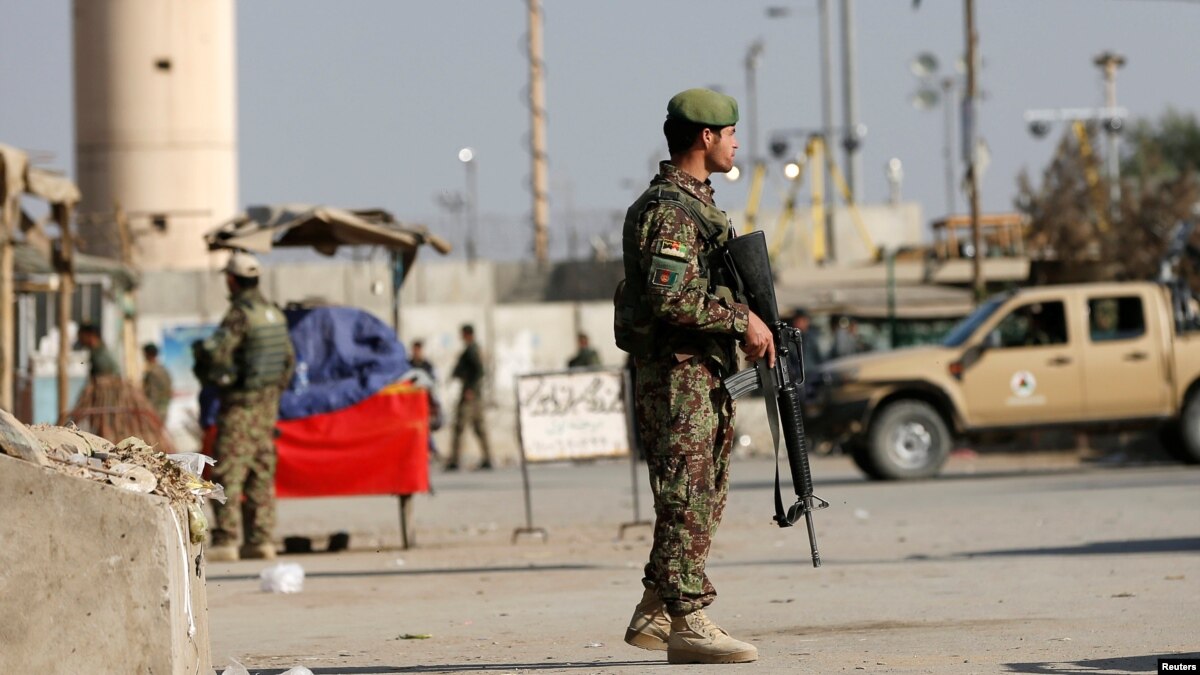
The U.S. military says one of its service members was killed and another injured during a combat mission in eastern Afghanistan.
In a statement, officials said several Afghan security forces were also killed and wounded during the same operation Monday. They did not elaborate further on the circumstances surrounding the casualties.
The military said the wounded U.S. service member was taken to Bagram Airfield's hospital for treatment and was in stable condition.
U.S. Forces-Afghanistan commander Gen. John Nicholson said the U.S. service members’ “valiancy in battle, and that of the brave Afghan partners they fought alongside, will endure in our hearts and history.”
The casualties in Afghanistan’s east came on the same day that a twin suicide bombing in the capital, Kabul, killed at least 26 people, including nine journalists. Islamic State claimed responsibility for that attack.
The United States and NATO officially concluded their combat mission in Afghanistan in 2014, shifting to a support role. Afghan forces have struggled to fight militants from the Taliban and Islamic State.
Netanyahu Claims Iran Hiding Nuclear Weapons Activity
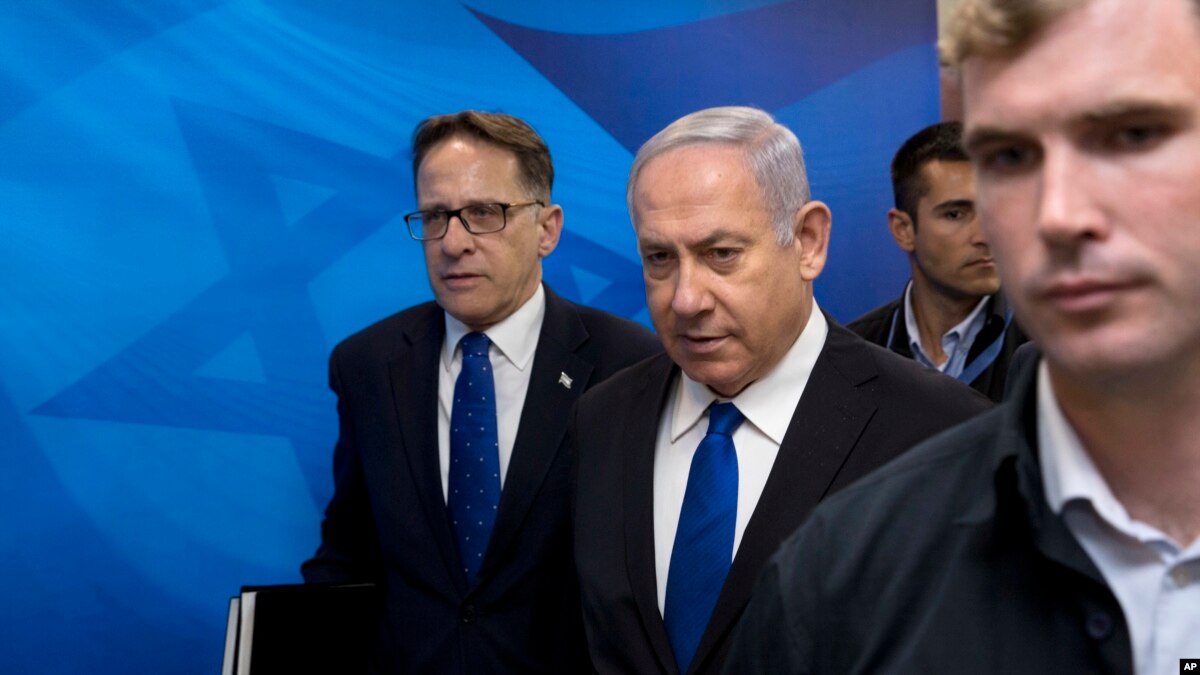
Israeli Prime Minister Benjamin Netanyahu says his country has "new and conclusive proof" that Iran has been hiding nuclear weapons activity, in violation of the 2015 international pact restraining Tehran's nuclear weapons development.
Ahead of the prime minister's prime time television address, a high-level Israeli political source told VOA the Jewish state had obtained "a large pile of documents that expose the facts that Iran has been cheating all the time" on the deal.
Netanyahu has long opposed the accord that the United States, Britain, France, Germany, Russia and China reached with Tehran in exchange for lifting economic sanctions that had hobbled the Iranian economy. He has said that the deal would not ultimately prevent Iran from becoming a nuclear power.
Netanyahu's speech comes after a weekend phone call with U.S. President Donald Trump, who is threatening to abrogate the deal in the coming days and reimpose sanctions on Iran. Trump has long complained that the pact has not prevented Iran from ballistic missile tests or stopped its military forays in Syria, Yemen and elsewhere in the Middle East.
New U.S. Secretary of State Mike Pompeo made clear Sunday that Trump will pull the U.S. out of the deal by May 12, against the wishes of American allies in Europe, unless it is "fixed" to the U.S.'s liking.
Pompeo Confirms US to Withdraw from Iran Deal Unless It Is Fixed
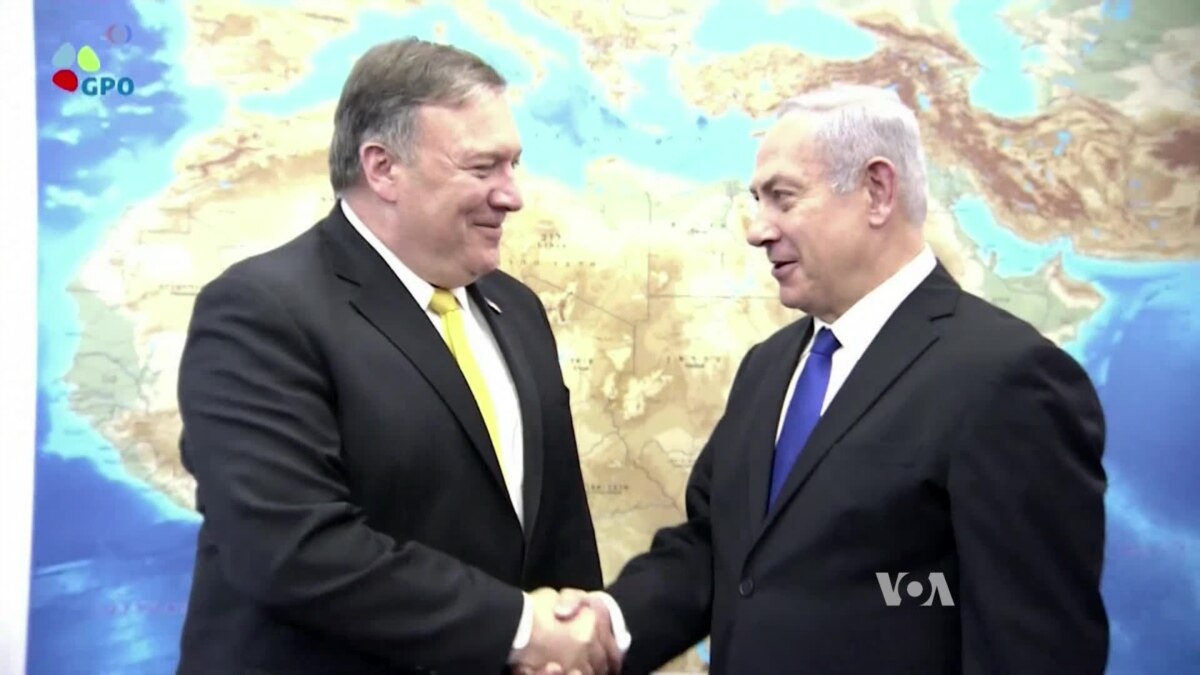
U.S. Secretary of State Mike Pompeo has told allies in the Middle East and Europe that the United States will withdraw from the Iran nuclear deal, known as the Joint Comprehensive Plan of Action or JCPOA, unless it can be fixed. Pompeo began his first official foreign trip just hours after he was sworn in on Thursday. After attending a NATO meeting in Brussels, he headed for high-level talks in Saudi Arabia, Israel and Jordan. VOA's Zlatica Hoke reports.
Sunday, April 29, 2018
Iraq Sentences 19 Russian Women for Joining IS
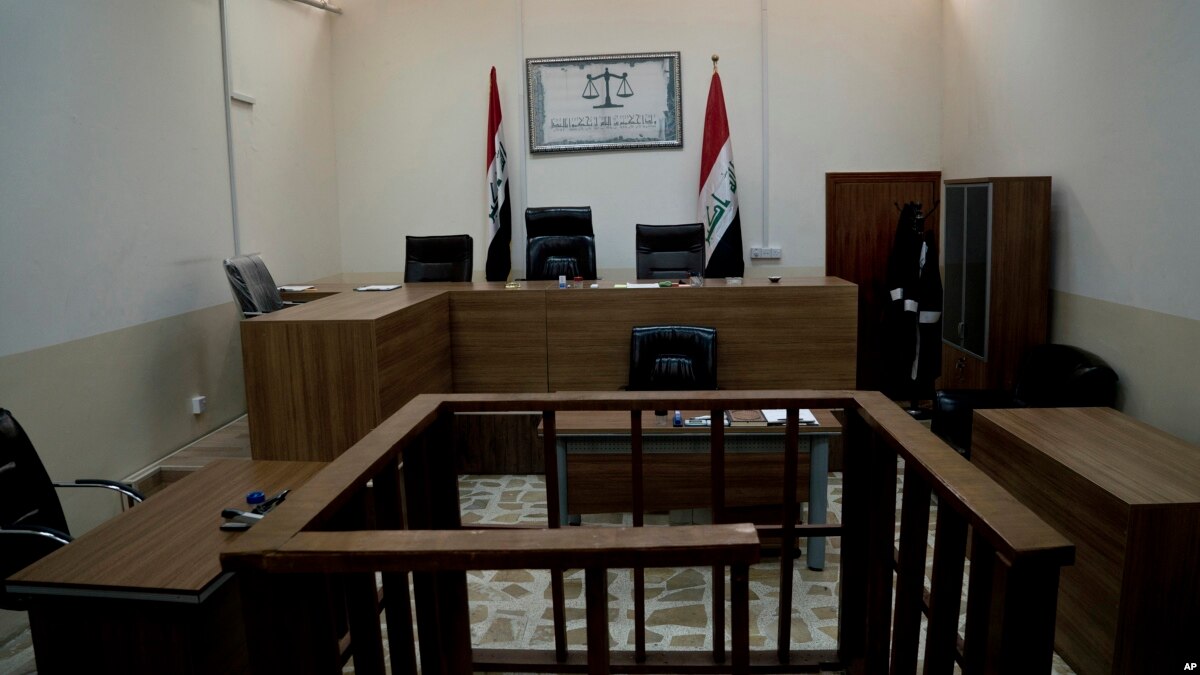
A court in Iraq has sentenced 19 Russian women to life in prison for joining the Islamic State terrorist group.
The Central Criminal Court in Baghdad, which deals with terrorism cases, also sentenced six women from Azerbaijan and four from Tajikistan to life in prison on Sunday on the same charge.
Most of the defendants told the court they had been brought to Iraq against their will from Turkey by IS fighters.
Earlier this month, the Russian Foreign Ministry said between 50 and 70 "Russian-speaking women" were being held in Iraq, along with more than 100 of their children.
IS took over nearly one third of Iraq in a blistering 2014 offensive, seizing control of the country's second largest city, Mosul, among others.
Baghdad declared military victory over the jihadists in December, after expelling them from all urban centers.
Experts estimate that Iraq is holding 20,000 people in jail over suspected IS membership. There is no official figure.
Iraqi courts have sentenced to death a total of more than 300 people, including dozens of foreigners, for belonging to IS.
US Secretary of State Mike Pompeo Arrives in Israel
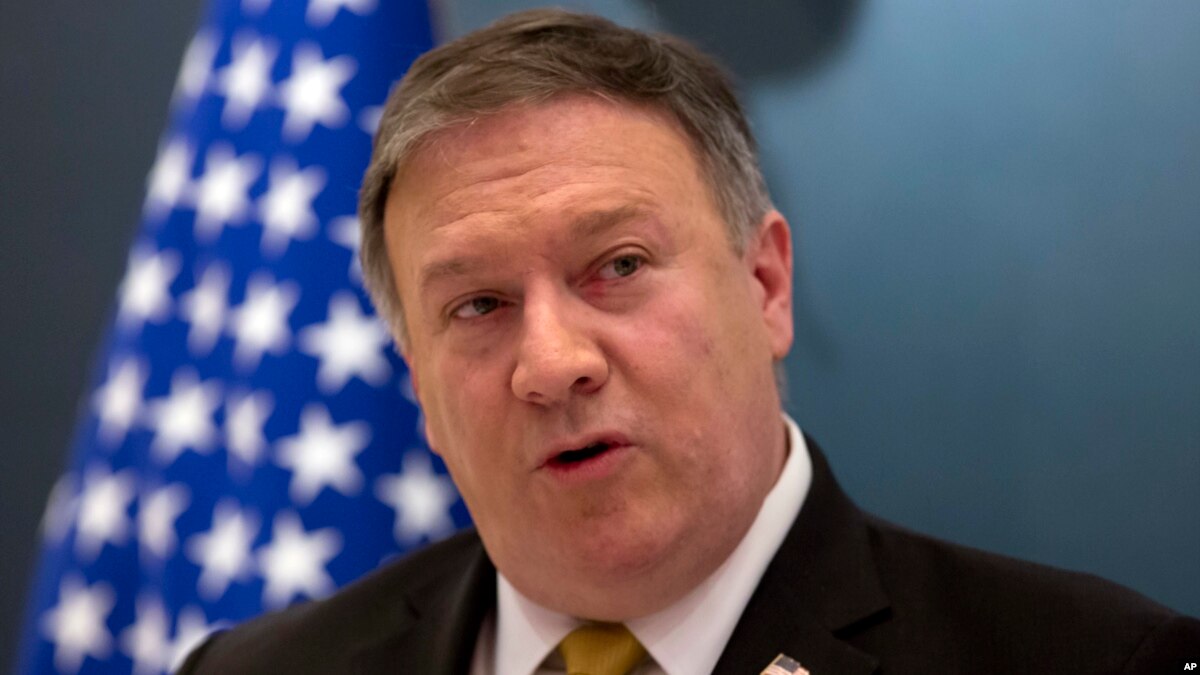
U.S. Secretary of State Mike Pompeo is in Israel Sunday as part of his first foreign trip since being confirmed in his new post.
He arrived from Saudi Arabia, where Pompeo's senior policy adviser, Brian Hook, who is accompanying Pompeo, called on European allies and other countries to impose sanctions on Iran to weaken its missile program.
"We are urging nations around the world to sanction any individuals and entities associated with Iran's missile program, and it has also been a big part of discussions with Europeans," Hook told reporters in Riyadh.
The three day trip, during which he is expected to brief U.S. allies on administration policy towards Iran, also includes a stop in Jordan.
Friday in Brussels Pompeo said no decision has been made on whether President Donald Trump will withdraw from the Iran nuclear deal, adding that negotiations are ongoing.
At his first news conference in his new job, Pompeo said, "Absent a substantial fix, absent overcoming the shortcomings, the flaws of the deal, he [President Trump] is unlikely to stay in that deal past this May."
Pompeo said he had discussed the nuclear deal, known as the Joint Comprehensive Plan of Action or JCPOA, with his NATO counterparts. The top U.S. diplomat said this issue likely would be high on the agenda when he travels to the Middle East after leaving Brussels.
Pompeo also fielded questions on countering Russian attacks on Western democracy, Ukraine, his visit to North Korea and morale at the State Department. Asked about a demoralized work force back in Washington, Pompeo said he had met with State Department officers at the NATO mission in Brussels. He said they may have been demoralized, but seemed in good spirits.
"They are hopeful that the State Department will get its swagger back, that we will be out doing the things that they came on board at the State Department to do, to be professional, to deliver American diplomacy around the world; that is my mission set."
Pompeo indicated he would meet with State Department employees on Tuesday after returning to Washington.
Asked about his recent meeting with North Korean leader Kim Jong Un, Pompeo declined to say if Kim is stable. Pompeo did say he believes Kim is serious about a planned summit with Trump. Pompeo congratulated the Republic of Korea and North Korea on a historic meeting, and the Korean people’s aspirations for peace and prosperity.
"Let there be no doubt, we would not be where we are today without President Trump’s maximum pressure campaign, and the work that has been done all around the world to apply pressure to North Korea."
Making his first trip hours after he was confirmed sent a strong signal of U.S. support to its NATO allies, Pompeo said:
"I hopped straight on a plane and came straight here," Pompeo told NATO Secretary-General Jens Stoltenberg. "There's good reason for that. The work that's being done here today is invaluable and our objectives are important and this mission means a lot to the United States of America."
Pompeo said President Trump "very much wanted me to get here."
Stoltenberg and others leaders in Brussels say they appreciated Pompeo's quick action to attend Friday's talks.
"I feel that that's a great expression of the importance of the alliance and the importance we attach to the alliance and I very much look forward to talking with you, on the need to adapt NATO to a more demanding security environment," the NATO secretary general told Pompeo.
Stoltenberg added, "Your valued and long experience will make you a perfect person to be the top diplomat of the United States."
International leaders and foreign policy experts will likely observe Pompeo closely in his first weeks on the job to get a read on where the United States stands, as North Korea, Syria and Iran dominate headlines.
Pompeo is said to be more "hawkish" on the Iranian government than his predecessor, Rex Tillerson, who wanted the U.S. to stay in the Iran nuclear agreement.
Tillerson was abruptly fired by Trump last month, just hours after returning from a trip to Africa. Trump said he and Pompeo are much more "on the same wavelength" on Iran and other issues.
During his confirmation hearing, a number of Democratic senators expressed concern that Pompeo is too close to Trump, and may not stand up to Trump when the two disagree on policy. Republican lawmakers noted Pompeo's close relationship to Trump will be a great asset on the world stage.
Read More US Secretary of State Mike Pompeo Arrives in Israel : https://ift.tt/2HGsUjyIran Confirms Arrest of British-Iranian Professor
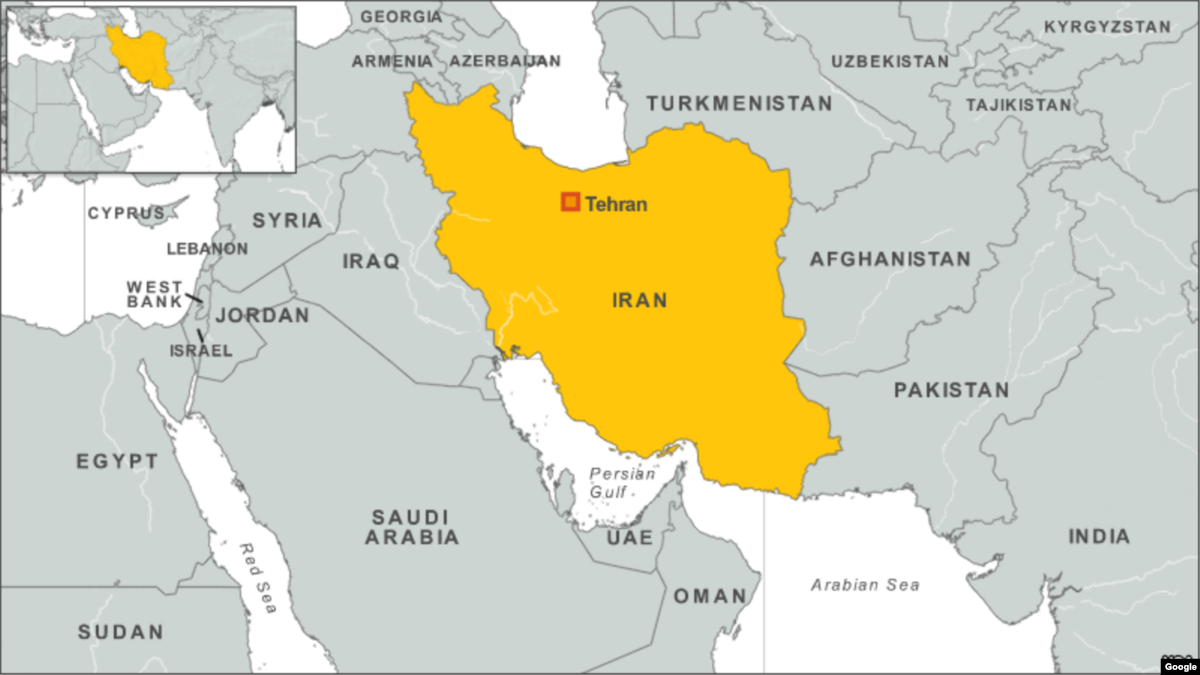
Iran's judiciary has confirmed the arrest of a British-Iranian university professor on security charges.
Abbas Edalat, a computer scientist and mathematician at Imperial College London, was reportedly arrested earlier this month by the Revolutionary Guard, which has detained several dual-nationals in recent years.
Iran's official IRNA news agency on Sunday quoted judiciary spokesman Gholamhossein Mohseni Ejehi as saying Edalat had been detained on "security charges," without elaborating. It was the first official confirmation of his arrest.
On Thursday, the semi-official Fars news agency said Edalat was one of several people arrested by the Guard over accusations of being part of a "network affiliated with Britain."
Edalat had actively campaigned against Western military action targeting Iran.
Saturday, April 28, 2018
Funeral Held for Top Houthi Official Killed in Yemen Airstrike
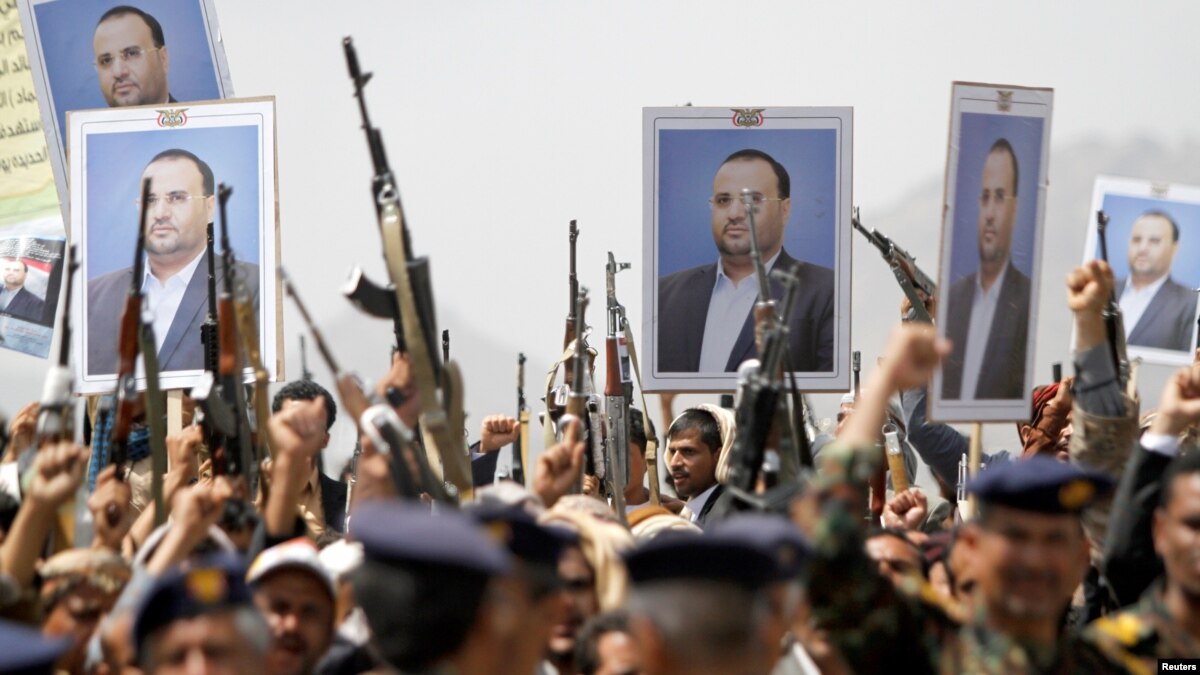
Thousands of Yemenis attended a funeral Saturday for a top Houthi rebel official killed more than a week ago in a Saudi-led coalition airstrike in the coastal province of Hodeida.
Saleh al-Samad, chief of the Houthis' Supreme Political Council, was killed in that airstrike along with six others. Al-Samad's successor, Mahdi al-Mashat, was among the mourners who attended the funeral in Sanaa's al-Sabeen Square.
Rebel leader Abdul-Malek al-Houthi has vowed to avenge the death of al-Samad.
Shortly after the funeral started, the Houthis said they had launched eight ballistic missiles into Sunni territory. The Saudi-led coalition said it had intercepted four of the missiles, which were headed for the coastal city of Jizan.
The coalition also said one man had been killed by flying debris from the attack.
Also Saturday, a Saudi-led coalition airstrike in Yemen's capital killed two Houthi leaders.
It was not immediately clear how many other people were killed or injured in the attack in Sanaa. Saudi Arabia's state-run television put the death toll at more than 50, while al-Arabia television said at least 38 rebels had been killed in the strike on the Houthis' interior ministry building.
More than 2 million people have become internally displaced in Yemen since March 2015. That is when the Saudi-led coalition, in support of Yemen's government, began a bombing campaign against Houthi rebels.
Yemen, the site of the world's largest humanitarian crisis, has more than 22 million people in need of assistance. Aid agencies warn needs are increasing, fueled by the ongoing conflict, collapsing economy, and lack of social services and livelihoods.
Russia, Iran, Turkey Criticize Western Airstrikes on Syria
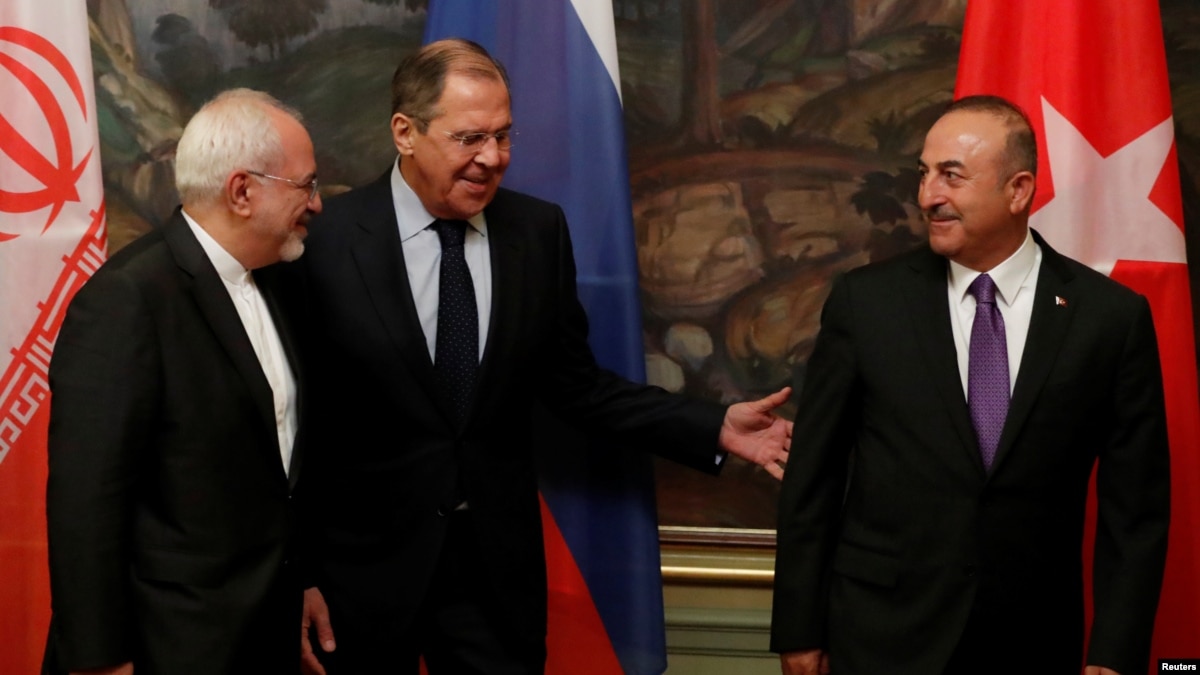
Russian Foreign Minister Sergey Lavrov said Saturday that airstrikes on Syria, conducted by the U.S., Britain, and France on April 14, were a violation of international law and indicated that the Western powers were trying to destroy the peace process.
Lavrov, speaking after meeting in Moscow with his Turkish and Iranian counterparts, said such "attempts to ... destabilize the situation" encourage the extremists in Syria to go on with their armed struggle.
Lavrov and his counterparts said they agreed that Syria's territorial integrity should be preserved, while accusing the United States of plans to "reformat" the Middle East and divide Syria into parts.
Iranian Foreign Minister Mohammad Javid Zarif said there was no military solution to the Syrian crisis. He also said that Iran condemned the use of chemical weapons and hoped that the investigation of an alleged Syrian attack on its own people would uncover the truth. He also said anyone who supported Iraq when it used chemical weapons against Iran in the 1980s had no right to criticize Syria today.
Turkish Foreign Minister Mevlut Cavusoglu said his country, too, supported Syrian territorial integrity and, with allies Iran and Russia, hoped ultimately to find a political solution to the crisis. He said "some groups" had tried to undermine that work, and he urged all parties to contribute to the peace process instead.
Turkey: Ex-president Won't Run Against Erdogan in Elections
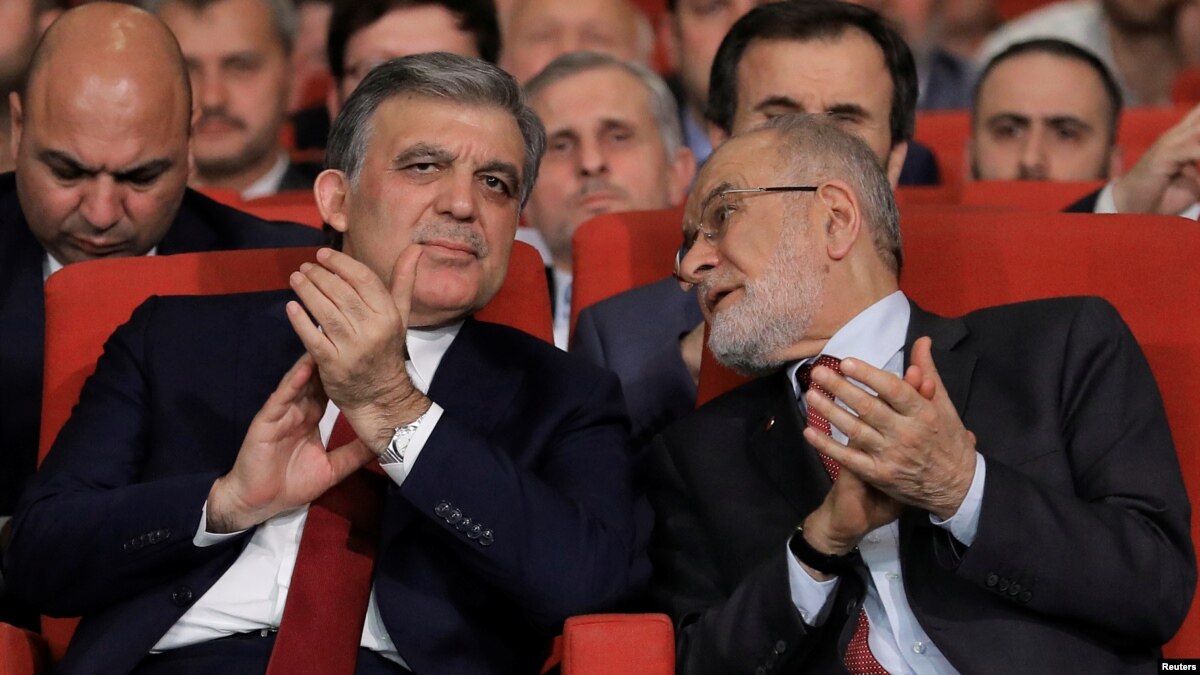
Former Turkish president Abdullah Gul has announced he would not be running in early elections, dispelling rumors of his candidacy.
Speaking in Istanbul Saturday, Gul said he would have considered running as a presidential candidate had there been "widespread agreement and desire" for him to do so. The ex-president left politics in 2014 but his name is often floated as a possible competitor to President Recep Tayyip Erdogan.
Erdogan announced presidential and parliamentary elections would be moved forward by more than a year to June 24, catching opposition parties by surprise.
Gul, a founding member of Erdogan's ruling party, briefly served as Turkey's prime minister following elections that brought the party to power in 2002. He served as Erdogan's foreign minister and Turkey's eleventh president.
Trial Starts in Iran for Suspects in 2017 Tehran Attack
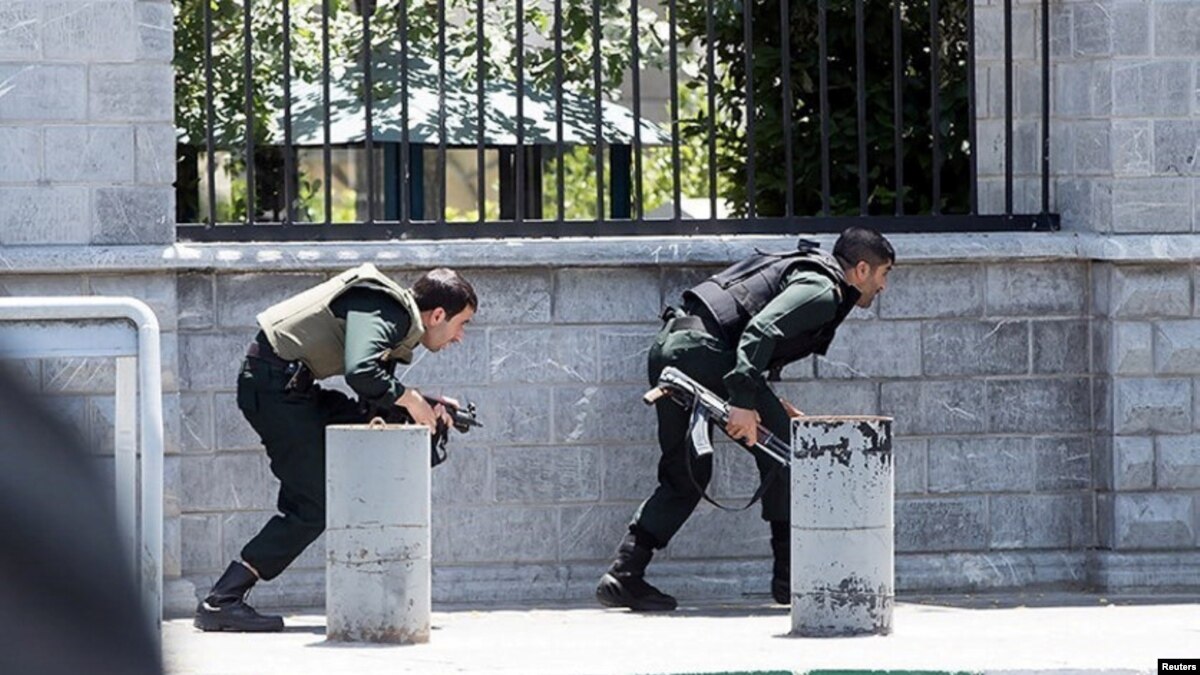
An Iranian media outlet is reporting that the trial of alleged members of the Islamic State group who took part in an attack in Tehran in 2017 has begun in the country's Revolutionary Court.
The report from the judiciary news website Mizanonline.com says the case involves 26 defendants and eight attended the first hearing Saturday with their lawyers. Charges include being members of a terrorist organization, weapons possession and unauthorized entry into the country.
According to his indictment, a suspect identified only as S.M. left the country in 2015 and joined the Islamic State group. In 2016, he re-entered to the country wearing a suicide belt and carrying weapons.
In June 2017, five militants linked to IS stormed Iran's parliament and a shrine to revolutionary leader Ayatollah Ruhollah Khomeini, killing at least 18 people and wounding more than 50.
Saudis: Airstrike Kills Houthi Leaders in Yemen
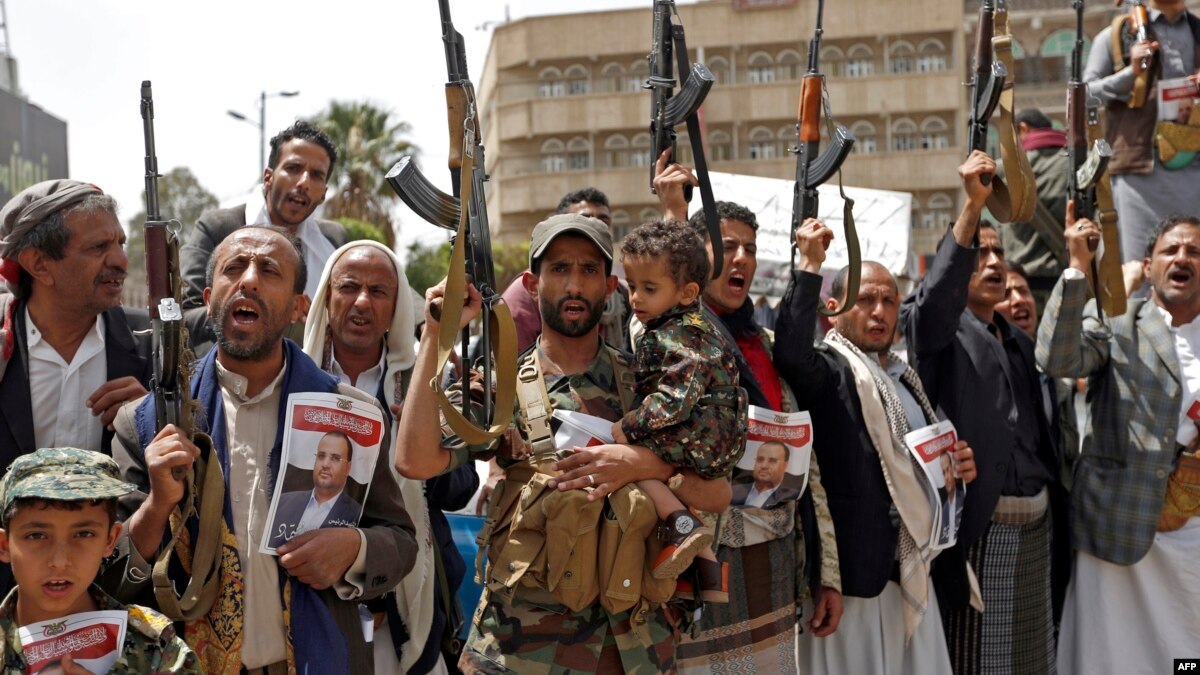
A Saudi-led airstrike targeting a high-level meeting of Shiite rebels in Yemen’s capital killed two of the group’s leaders and dozens of their militiamen, the kingdom’s state media reported early Saturday. The Shiite rebels known as Houthis did not immediately acknowledge the strike.
Saudi state-run television offered the report, saying the strike Friday killed more than 50 militiamen, including the two leaders. It did not elaborate.
That dispatch followed a far more detailed report on the strike by Al-Arabiya, a Dubai-based satellite news network now believed to be majority-owned by Saudi Arabia.
Al-Arabiya, without offering a source for its information, said the strike hit a building belonging to Yemen’s Interior Ministry in the country’s rebel-held capital, Sanaa. It said more than 38 Houthi fighters including the two leaders were killed in the strike targeting a high-level meeting.
Al-Masirah, a Houthi-run satellite news channel, acknowledged Houthi leaders met Friday to discuss Saturday’s funeral of Saleh al-Sammad, a Houthi political leader earlier killed in a Saudi airstrike. However, Al-Masirah only reported an airstrike Friday night in Sanaa it said wounded civilians.
Yemen’s 3-year-old war has killed more than 10,000 people, displaced 2 million and helped spawn a devastating cholera epidemic in the Arab world’s poorest country. It began after the Houthis swept through Sanaa and farther south, sparking a Saudi-led military intervention on behalf of the country’s internationally recognized government.
The kingdom’s devastating air campaign repeatedly has struck markets, medical facilities and civilian targets, drawing international criticism. The coalition’s blockade on ports under Houthi control has been a main factor pushing the country into near starvation, according to United Nations agencies and rights groups.
Meanwhile, the Iranian-backed Houthis face criticism for laying mines that have killed and maimed civilians, while allegedly diverting humanitarian aid to their own cadres and conducting mass roundups of their perceived enemies.
Friday, April 27, 2018
Palestinians Say Israeli Live Fire Killed 3 at Gaza Border
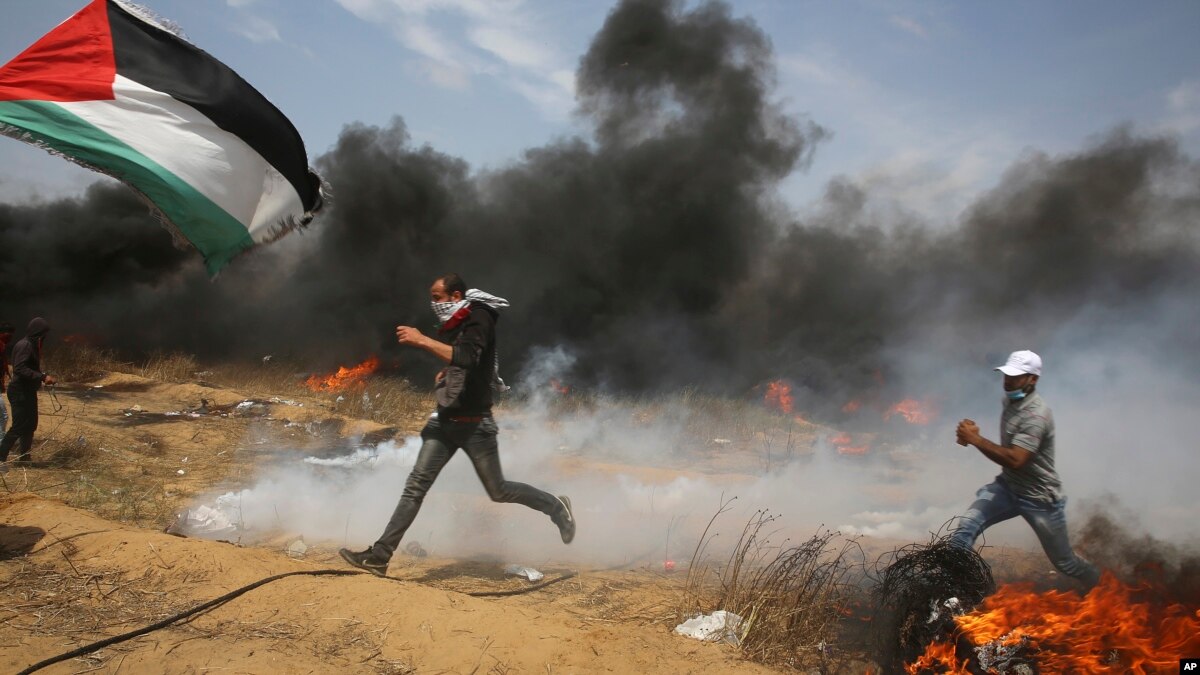
Palestinian officials said Israeli soldiers on Friday fatally shot three Palestinian protesters in Gaza as thousands of Palestinians demonstrated along the border for a fifth consecutive week.
Protesters gathered a few hundred meters from the Gaza Strip’s border fence with Israel, with some throwing stones and setting tires on fire. Witnesses said a smaller group approached the fence and tried to break through it, drawing Israeli fire of tear gas, rubber pellets and live rounds. The violence has become a weekly occurrence since the protests began in March.
Israel has defended opening fire on the protesters, saying it is defending its sovereign border. Israel also accuses Hamas, which rules Gaza, of using the protesters as cover to carry out attacks. Hamas denies the charge.
Palestinian health officials said that in addition to the three people killed Friday, more than 600 others were injured, including 138 hit by live fire.
The violence came hours after the U.N. human rights chief criticized Israel for using “excessive force” against demonstrators.
In a statement Friday, U.N. High Commissioner for Human Rights Zeid Ra’ad Al Hussein called the loss of Palestinian lives over the past five weeks “deplorable.”
“The staggering number of injuries caused by live ammunition only confirms the sense that excessive force has been used against demonstrators — not once, not twice, but repeatedly,” he said.
At least 41 protesters have been killed by Israeli live fire and more than 1,600 wounded in the weekly protests since March 30, according to Palestinian health officials.
The demonstrations, set to end May 15, are designed to commemorate what Palestinians refer to as the Nakba, or “catastrophe,” when hundreds of thousands of Palestinians had to flee their land or were expelled during the war in 1948 that led to the creation of Israel.
The demonstration is expected to end at the same time Washington plans to open an embassy in Jerusalem, a move that has infuriated Palestinians, who have claimed the eastern section of the city as the capital of their future state.
Amnesty Accuses Turkey of Silencing Civil Society
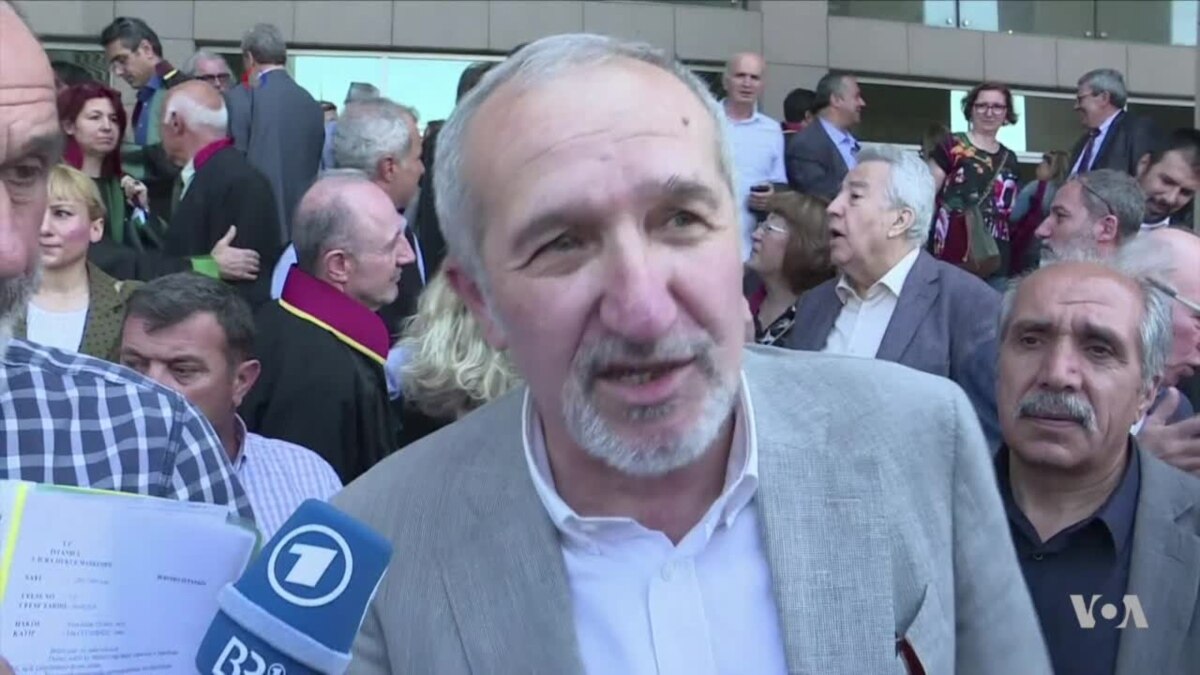
Amnesty International says the ongoing state of emergency in Turkey has resulted in mass arrests and dismissals, and the silencing of human rights defenders through threats, harassment and imprisonment. Ankara says it is cracking down on terrorists. As Henry Ridgwell reports, opponents of President Recep Tayyip Erdoğan fear elections called for June will increase his powers.
Thursday, April 26, 2018
PLUGGED IN: Looming Deadline on Iran Nuke Deal, North Korea Talks on White House Agenda
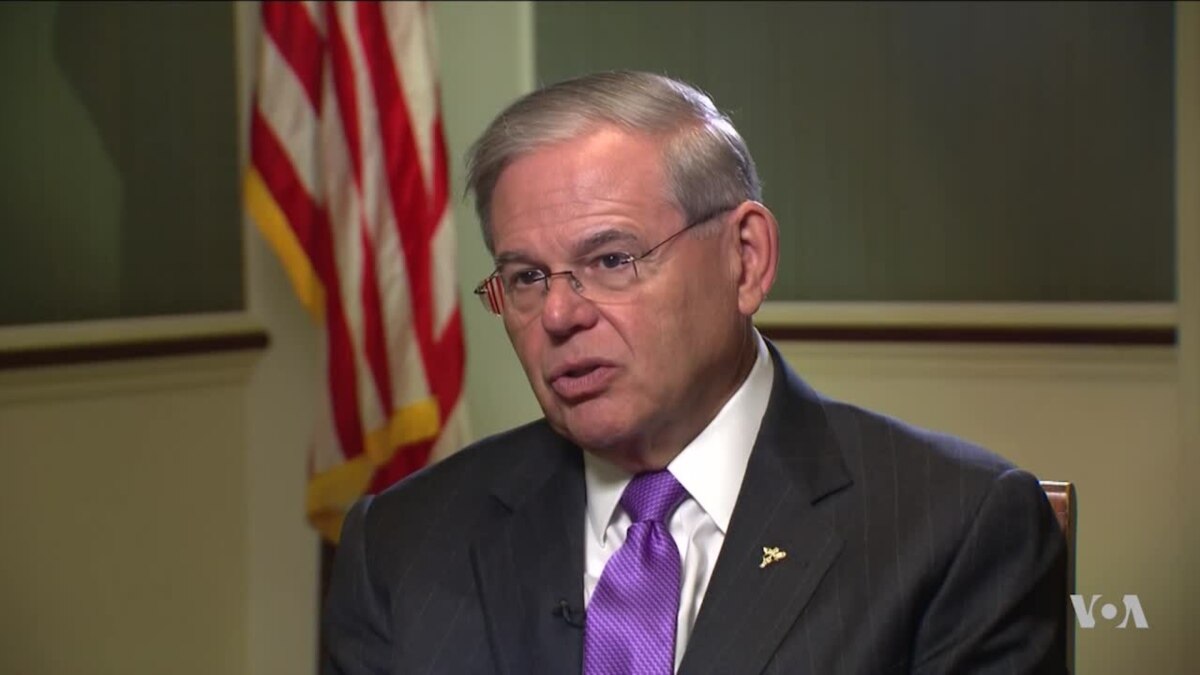
Washington's efforts to denuclearize North Korea and Iran are expected to face close scrutiny soon. That's because a deadline that would allow the U.S. to back out of the international Iran nuclear deal is fast approaching. Washington is also working toward finalizing a summit with North Korean leader Kim Jong Un, which President Trump says could take place as early as June. Nuclear diplomacy was the subject of this week's "Plugged In With Greta Van Susteren" on VOA. Robert Raffaele has more.
9 Israeli Teenagers Die in Flash Floods
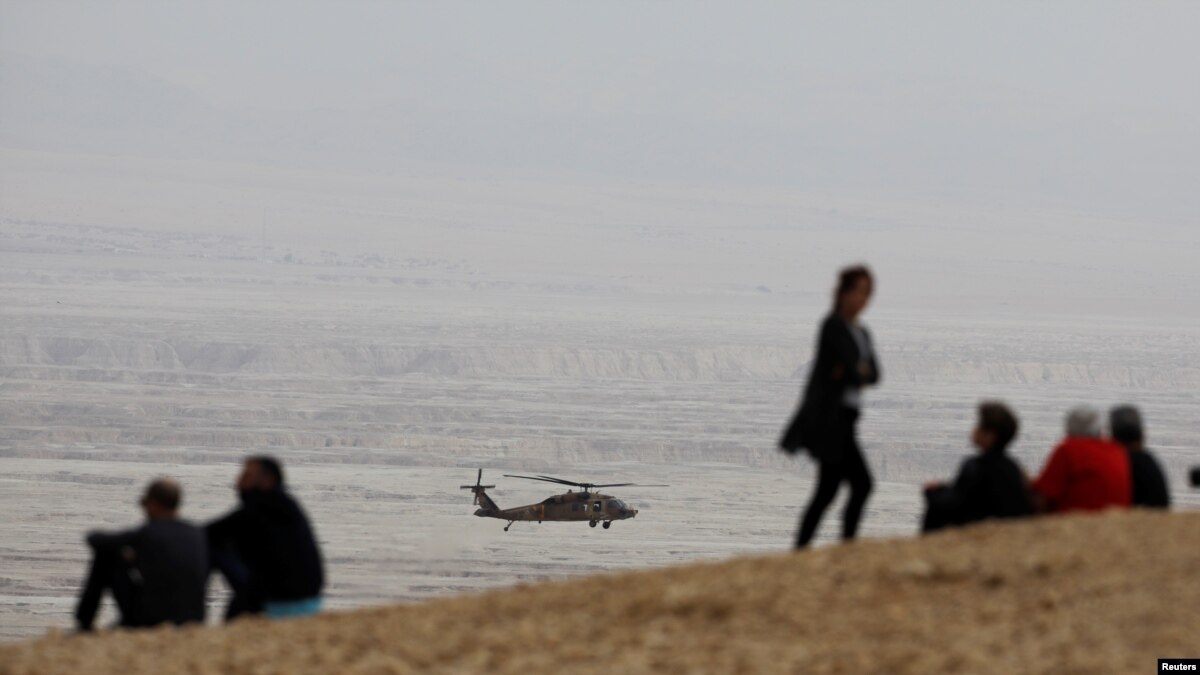
Flash floods killed nine Israeli teenagers who were hiking south of the Dead Sea on Thursday, Israel's rescue service said.
The casualties were all 18 years old. Israeli media said eight of the fatalities were female and one was male.
Police said another hiker is still missing.
Earlier, spokesman Micky Rosenfeld said 25 students in a pre-army course were “caught off guard” and some were “washed away” by heavy rains while they were hiking in the area.
He said 15 people were rescued.
The downpour caused parts of Israel’s security barrier with the West Bank to collapse, Rosenfeld added.
Police and army helicopters were deployed to search for the missing member of the group. But search operations were suspended by nightfall until the morning due to harsh conditions, police said.
The Dead Sea, the world's lowest point at about 1,400 feet below sea level, is surrounded by desert and generally arid cliffs. Rain can come rushing down the steep descents, causing sudden and violent torrents in otherwise dry spots.
Heavy rainfall has fallen sporadically over the past two days.
Russia Presents Unharmed Syrians to OPCW
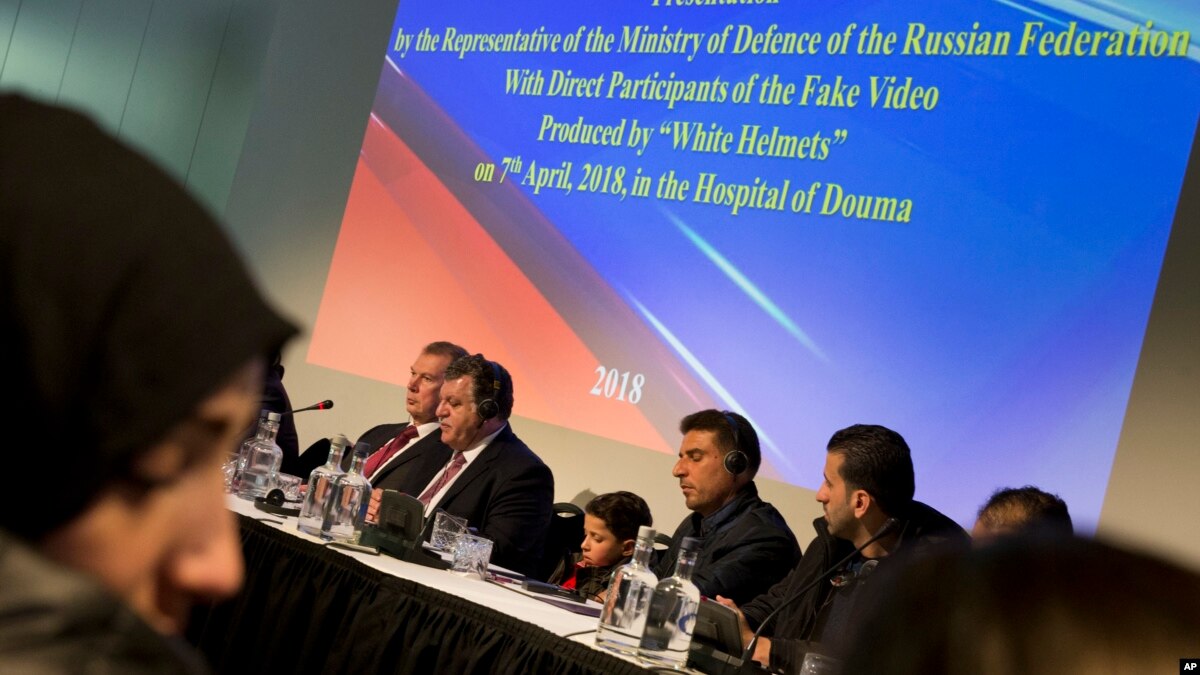
Russia and Syria presented several unharmed people from Gouta, Syria, at the premises of the Organization for the Prohibition for Chemical Weapons on Thursday to support claims that there was no chemical attack in the city earlier this month.
Britain dismissed the move as a stunt, and said allied powers including France and the United States had boycotted the closed-door briefing.
"The OPCW is not a theater," said Peter Wilson, Britain's envoy to the watchdog in a statement. "Russia's decision to misuse it is yet another Russian attempt to undermine the OPCW's work, and in particular the work of its Fact Finding Mission investigating chemical weapons use in Syria."
Russia and Syria intend to hold a news conference near the OPCW premises in the Hague later. An invitation said the event would include "participation of witnesses from Syria who were used in staged videos of the 'chemical attack' in Douma."
OPCW investigators are looking into whether chemical weapons were used in Gouta in the April 7 attack that killed dozens of people. They visited a second site in Gouta, an enclave outside of the Syrian capital, on Wednesday to take samples.
The attack led to air strikes by the United States, France and Britain against sites in Syria. They accused the government of President Bashar al-Assad of using chemical weapons, possibly a nerve agent. Syria and its ally Russia have denied the accusation and said rebel forces staged the attacks.
France's Ambassador to the OPCW Philippe Lalliot called the display of Syrians in The Hague "obscene."
"This ... does not come as a surprise from the Syrian government, which has massacred and gassed its own people for the last 7 years," he told Reuters.
He said it was more surprising coming from Russia.
"One cannot but wonder if the weaker [Syria] is not taking the stronger [Russia] on a path beyond its interests, if not its values."
Mattis: No Decision Yet on US Withdrawal From Iran Deal
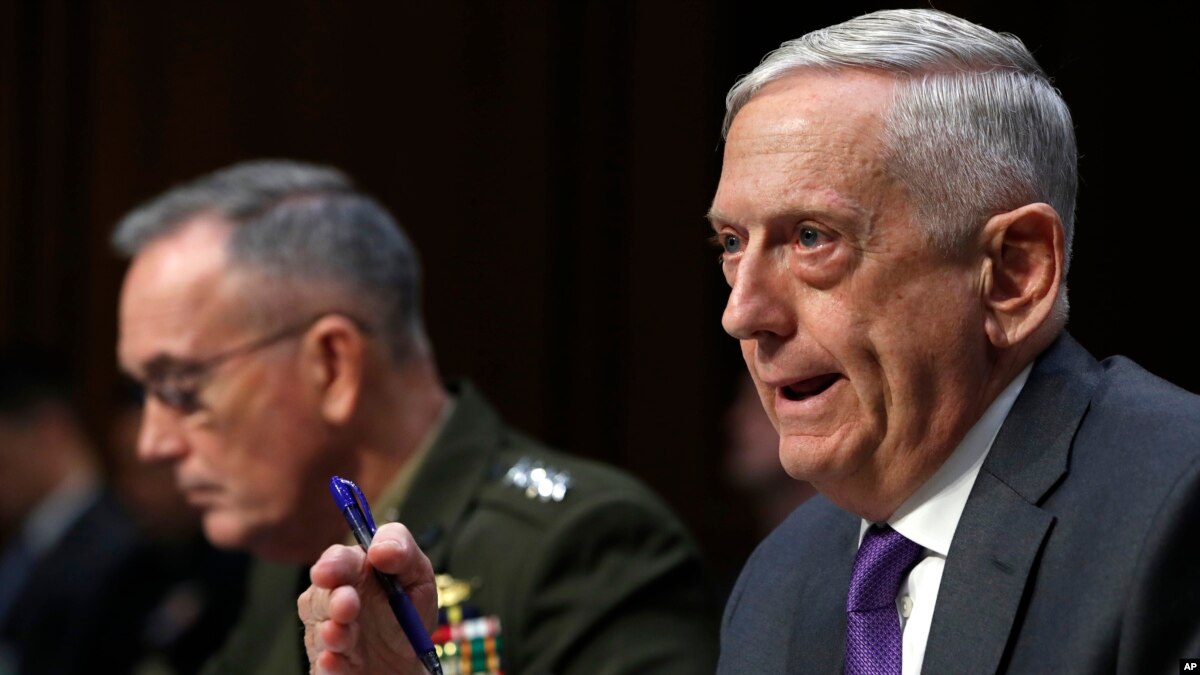
Defense Secretary Jim Mattis says there has been no decision made on any U.S. withdrawal from the 2015 Iran nuclear agreement but Washington is working with its European allies to see if there are ways to improve the pact.
"The decision has not been made whether we can repair it enough to stay in it, or if the president is going to decide to withdraw from it," Mattis told a Senate Armed Services Committee hearing Thursday.
He said the U.S. recognizes the nuclear pact was an "imperfect arms control agreement." "It is written almost with the assumption that Iran would try to cheat. So the verification, what is in there, is actually pretty robust," Mattis said. "Whether or not that is sufficient, I think that is a valid question."
French President Emmanuel Macron, who just wrapped up a U.S. visit, said Wednesday he believes U.S. President Donald Trump will pull the United States out of the nuclear agreement.
"I don't know what the American decision will be but the rational analysis of all [of] President Trump's statements does not lead me to believe that he will do everything to stay in the JCPOA (Iran nuclear deal)," Macron told a news conference at the conclusion of his three-day state visit.
Asked if such a decision would indicate a personal failure, Macron said his role was not to convince Trump to "walk away from campaign commitments, but rather to prove that the agreement makes sense.”
Earlier Wednesday, Macron urged U.S. lawmakers to ensure the United States does not abandon the Iran nuclear deal.
"Iran shall never possess nuclear weapons, not in five years, not in 10 years, never," Macron declared in a ringing, 49-minute speech to both chambers of the U.S. Congress.
Trump is set to decide next month whether to renew sanctions relief for Iran. The agreement lifts sanctions on Tehran in exchange for limits on the country's nuclear development.
The U.S. president has called the agreement "insane" and "ridiculous" and has threatened to withdraw from it.
Instead Macron, as he did in talks with Trump Tuesday, called for negotiations for a new agreement with Iran over Tehran's ballistic missile tests and military involvement in Syria, Yemen, Lebanon and Iraq.
Syrian War Produces More Refugees as Aid Funds Fall Short
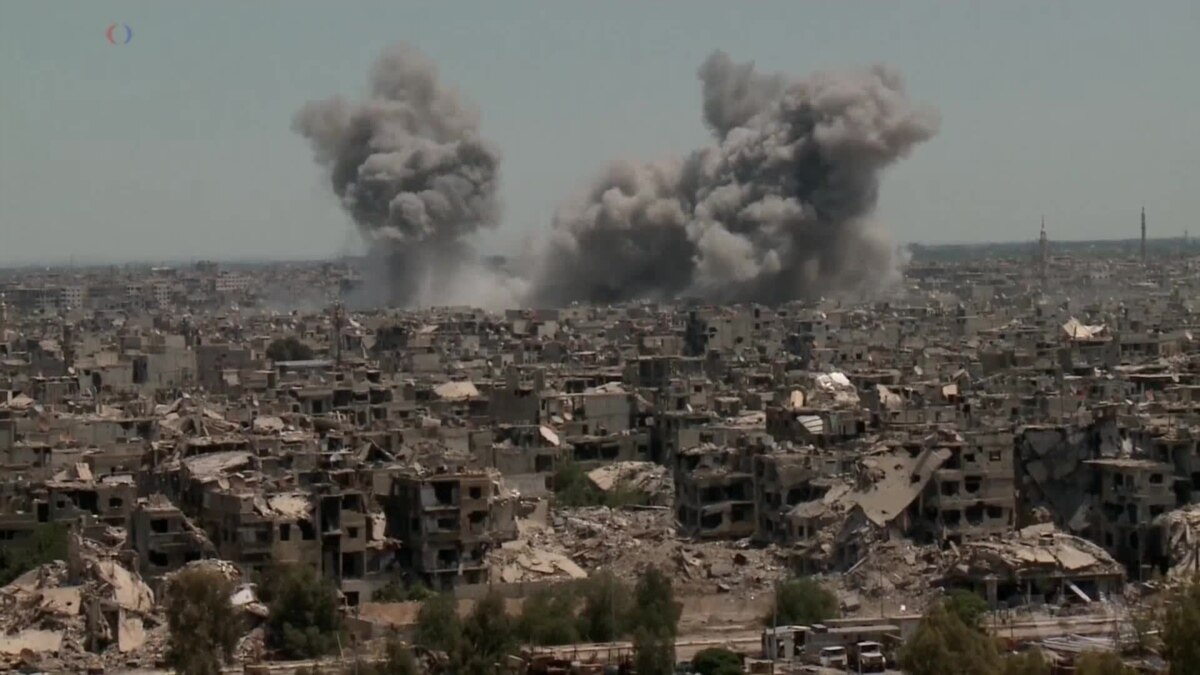
International donors pledged an estimated $4.4 billion in humanitarian aid for Syria and neighbors sheltering its refugees in 2018. The amount pledged at a conference in Brussels Wednesday falls short of the more than $7 billion the United Nations is seeking. Meanwhile, a U.N. official for humanitarian affairs told the U.N. Security Council in New York the escalation of attacks on civilians and civilian infrastructure in Syria is creating a new humanitarian crisis. VOA's Zlatica Hoke reports.
Supreme Court Hears Arguments in Travel Ban Case
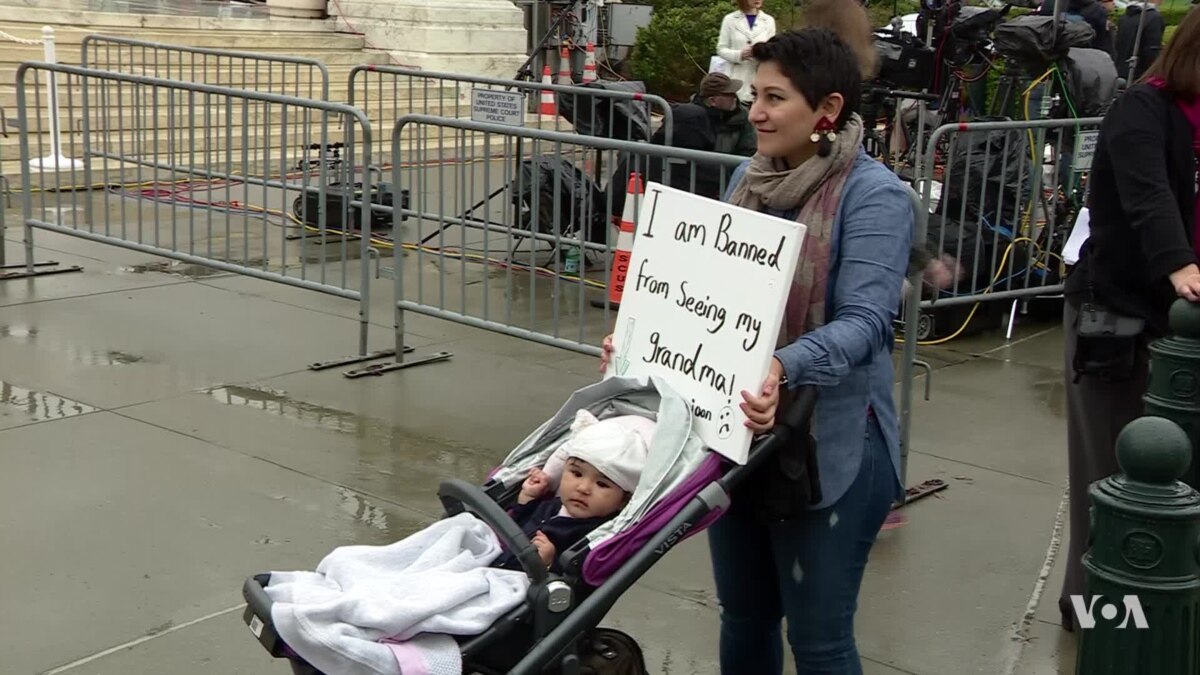
The U.S. Supreme Court heard oral arguments on the Trump administration's third attempt to implement a ban on travelers from some countries. Protesters argued outside the court that it targets Muslims disproportionately. The government says the policy is needed for security reasons. Either way, for one young Washington family, it means a grandmother can't meet her daughter's first child. Victoria Macchi has more from outside the court.
PLUGGED IN: Looming Deadline on Iran Nuke Deal, North Korea Talks on White House Agenda
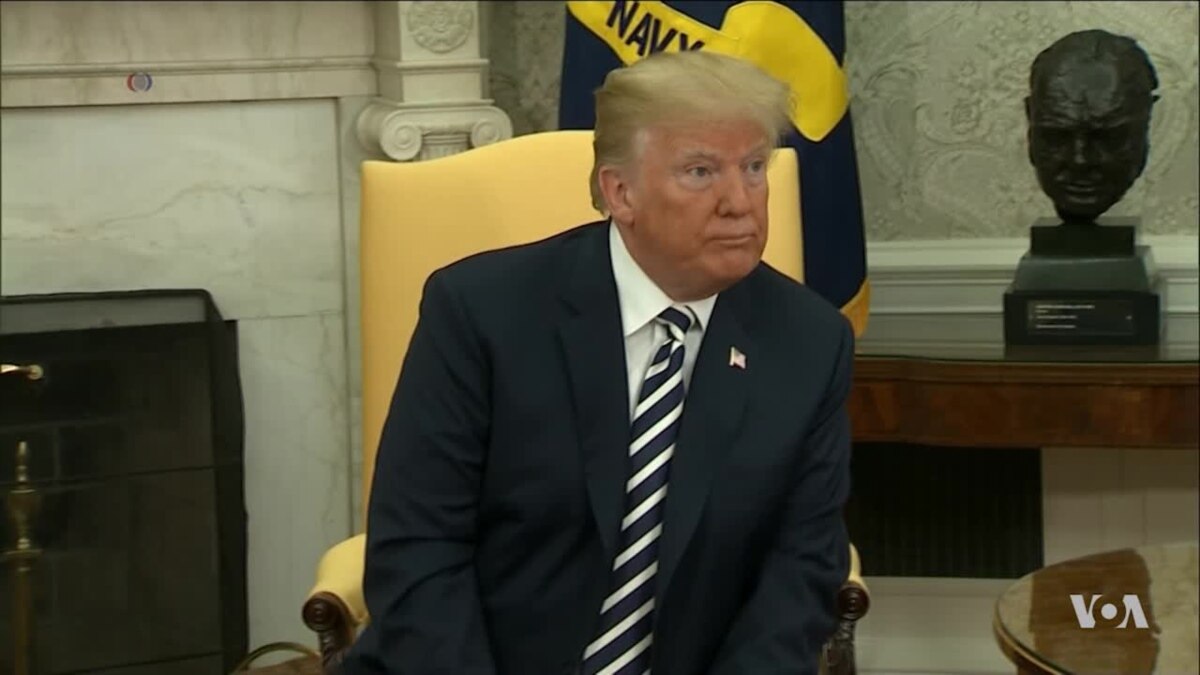
Washington's efforts to denuclearize North Korea and Iran are expected to face close scrutiny soon. That's because a deadline that would allow the U.S. to back out of the international Iran nuclear deal is fast approaching. Washington is also working toward finalizing a summit with North Korean leader Kim Jong Un, which President Trump says could take place as early as June. Nuclear diplomacy was the subject of this week's "Plugged In With Greta Van Susteren" on VOA. Robert Raffaele has more.
Wednesday, April 25, 2018
Czech Leader Suggests Embassy Move to Jerusalem
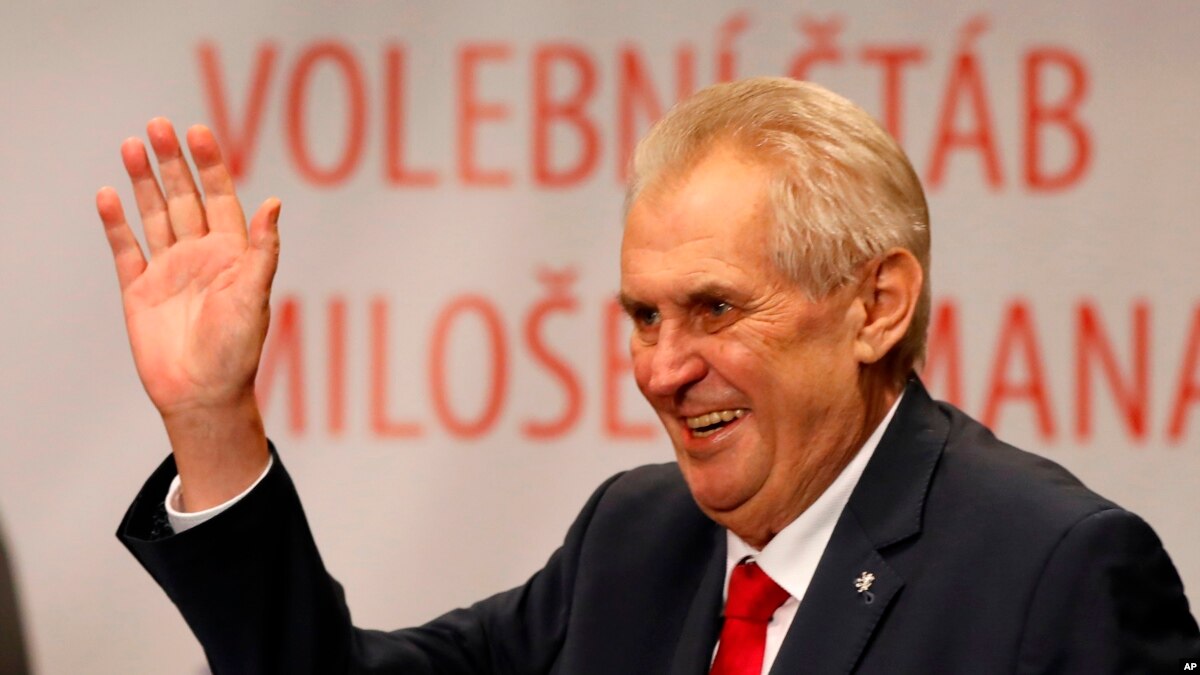
The Czech Republic's president suggested Wednesday that his country was considering joining the U.S. in moving its embassy in Israel from Tel Aviv to Jerusalem.
But the Czech government, which controls foreign policy, didn't confirm the announcement.
President Milos Zeman spelled out the process of moving the embassy, saying it would take place in three steps: An honorary consulate will be opened in Jerusalem next month, followed by other Czech institutions before the embassy's actual transfer.
Beyond the consulate's opening, he gave no further timetable.
He ended his speech at the Prague Castle at a party to celebrate Israel's 70th anniversary by saying: "Next year in Jerusalem.''
In a letter to Zeman, Israeli Prime Minister Benjamin Netanyahu said he hoped he would jointly open the new embassy in Jerusalem at the end of this year.
The Czech foreign ministry didn't immediately confirm the embassy's move, though it did say that the opening of the consulate and the Czech cultural center in west Jerusalem was the first step toward having its embassy in the capital of the host country.
But it also said the Czech Republic "fully respects'' the common position of the European Union that Jerusalem must be the joint capital of Israel and a future Palestinian state.
As that's unlikely to happen soon, the embassy transfer Zeman hopes for is far from being imminent.
The Czech presidency is a largely ceremonial post.
Zeman previously voiced support for President Donald Trump's decision to move the U.S. Embassy in Israel from Tel Aviv to Jerusalem, which sparked outrage among Palestinians and across the Muslim world.
Palestinians claim eastern Jerusalem, territory captured by Israel from Jordan in the 1967 war, as their future capital. Israel claims all of Jerusalem as its eternal capital.
Israel Cancels Deportation Orders Against African Migrants
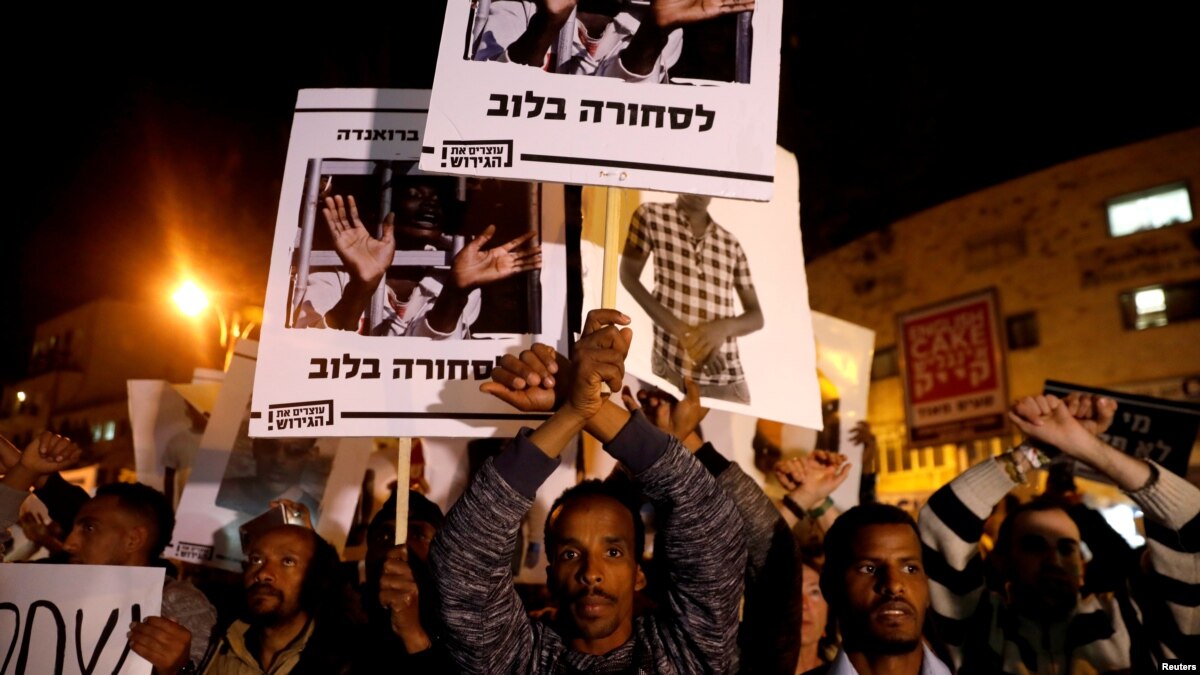
Israel has abandoned a plan to deport thousands of African migrants.
About 37,000 African migrants have gotten a reprieve after Israel canceled deportation orders that had left the community in limbo. In February, the government handed out papers to thousands of African males, which amounted to an ultimatum: leave the country in two months or go to prison.
The plan was abandoned when Rwanda backed out of a deal to take the migrants in, saying it could not guarantee their safety.
In a radio interview, Public Security Minister Gilad Erdan admitted that the government has "no solution" for the problem of the "infiltrators," as they are called here. He blamed Israel's Supreme Court and human rights groups, which warned that forcibly deporting the migrants back to Africa would endanger their lives.
Most of the Africans came from war-torn Eritrea and Sudan, and entered Israel illegally over the past decade. Teklit Michael, who came from Eritrea, breathed a sigh of relief.
"I am very happy to see the deportation policy is canceled," said Michael. "And now is the right time for the Israeli government to give a solution for the asylum seekers who came from Africa: a refugee status or to answer their asylum claim application."
But the Israeli government rejects the Africans' claim they are refugees, with this legislator describing it as a "lie."
Yoav Kish of the ruling right-wing Likud party said they are economic migrants seeking to escape poverty in Africa, and therefore Israel is not obligated to take them in.
Officials blame the Africans for rising crime in southern Tel Aviv and accuse them of damaging the Jewish character of the state. So the government is looking for new ways to pressure them to leave voluntarily.
But many Israelis are sympathetic toward the migrants. They say Israel has a moral responsibility to offer them asylum because the country was built by Jewish refugees fleeing the Holocaust.
WHO Joins Urgent Call to Stop Malaria's Resurgence
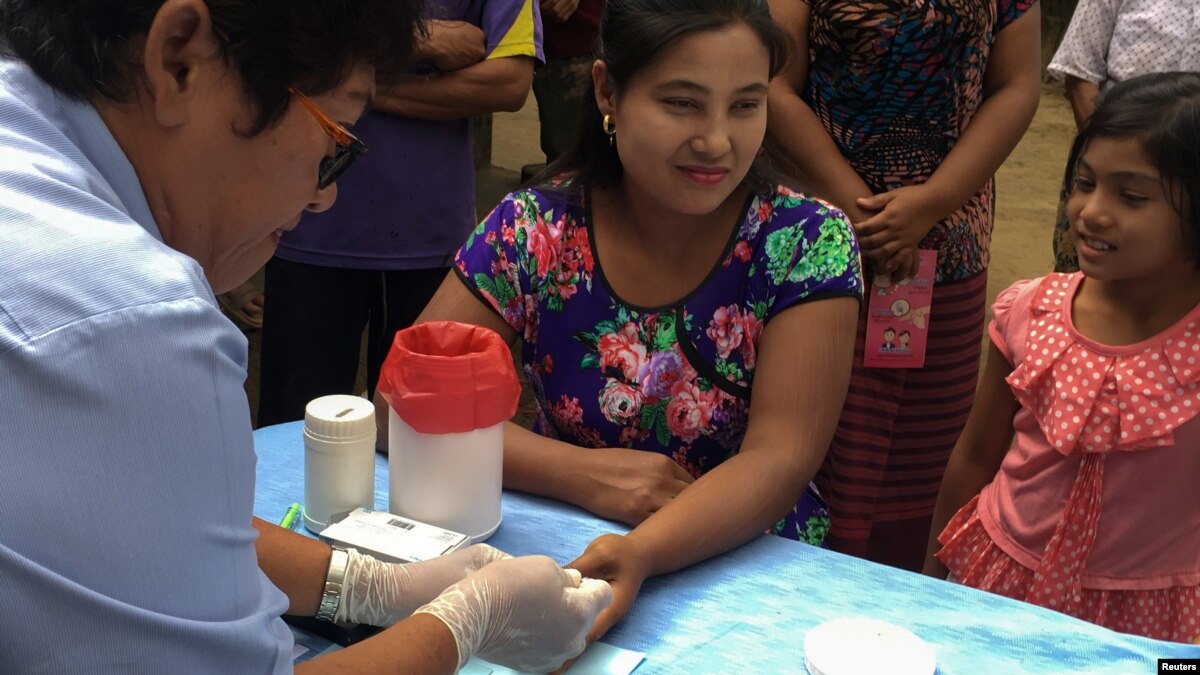
The World Health Organization is joining a worldwide call to stop a resurgence of malaria that threatens much of the progress made over the past decade. To mark World Malaria Day, WHO is pushing for urgent action - and money - to get the global fight against this ancient scourge back on track.
For many years, World Malaria Day has been a cause for celebration, but not this year. World Health Organization data show that starting in 2016 progress has been at a standstill and hopes of ending the global epidemic by 2030 are slipping away.
Watch: Fears Grow Over Malaria Resurgence, London Summit Urges Global Action
Director of WHO's Global Malaria Program, Pedro Alonso, says some of the gains made in reducing the number of cases and deaths in countries across all regions of the world are being reversed.
"As a consequence, we now have about 260 million cases of malaria every year, in excess of 440,000 deaths every year…13:52…History has told us very clearly that when we stop making progress, it is not that we just stand still, but we go backwards and then malaria comes back, and comes back with a vengeance," Alonso said.
About 90 percent of all malaria cases and deaths occur in sub-Saharan Africa. Children under the age of five, pregnant women and patients with HIV-AIDS are most at risk.
Alonso says global political commitment must be renewed and donors and affected countries must increase the financial resources needed to successfully tackle malaria.
"And, we need new and improved tools to prevent, diagnose and treat malaria," Alonso said. "Our sense is that with the resources available today and with the tools we have today, we have seen the limit of what can be achieved."
The issue of malaria's resurgence came up on the sidelines of a Commonwealth summit in London this month, where Microsoft co-founder Bill Gates who has invested billions of dollars in fighting malaria pledged yet another one billion dollars to the effort.
WHO estimates $5.5 billion are needed each year to wage a successful global fight against malaria. However, only about half that amount has been pledged.
Vector control is the main way to prevent and reduce the spread of malaria. Alonso says better insecticides, better insecticide-treated mosquito nets as well as better drugs are essential in combating the disease.
Tuesday, April 24, 2018
UN Official: Farming Should Be at Heart of Syria Reconstruction
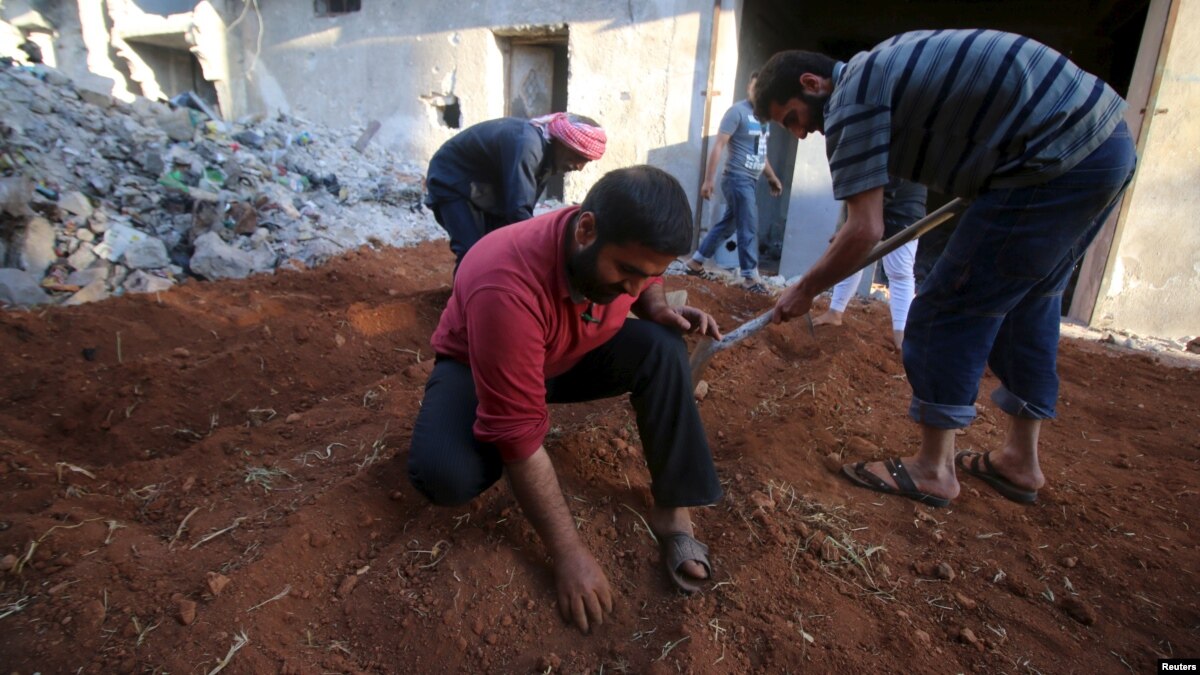
International efforts to rebuild Syria once the civil war is over should center on agriculture to kick-start the economy and quickly improve the livelihoods of the people, a high-level U.N. official said Tuesday.
In an interview with The Associated Press ahead of an international Syria donors conference, Daniel Gustafson, the U.N. Food and Agriculture Organization's deputy director general, said that in case of a return to peace, the impact of funding farming would yield almost immediate results.
"If you invest in that, you are going to get a quick return," he said.
Despite seven years of warfare through much of the Middle Eastern nation, which also blighted farmland and destroyed facilities, farming still accounts for about a quarter of Syria's gross domestic product.
U.N. figures show that $16 billion in production has been lost because of the war and it will take about as much to get the recovery of farming going again. At the two-day Syria conference opening Tuesday, donors from across the globe hoped to commit several billion in assistance to alleviate the pressing needs of Syrians. Over $5 billion was committed last year.
Farming in Syria goes back many thousands of years, and the nation was long a breadbasket for the area. When the war started, almost half the population was still employed in farming.
And despite the horrific war that ravaged orchards and fields, cut the availability of seeds and fertilizers, and sent many millions fleeing, half the output survives to this day.
"The resilience of the agriculture sector is an astonishing story. You still have half the production of wheat of what you had before the war" — 2 million tons, instead of 4 million before the war, Gustafson said.
Still, 6.5 million people urgently need assistance because they lack food, said Gustafson.
While most of the attention goes to shocking events like bombings or even gas attacks, war in the countryside often has a more creeping effect.
"It is this continuous deterioration of their livelihoods. You cannot get seeds, you cannot sell stuff, you cannot trade, you cannot get spare parts," Gustafson said. "The whole thing just kind of grinds down."
He said that fortunately, the situation can pick up again soon once the conditions are right, once the right seeds come in again, and once people and goods are again free to move around the country.
Local Tensions Flare up Before Lebanese Election
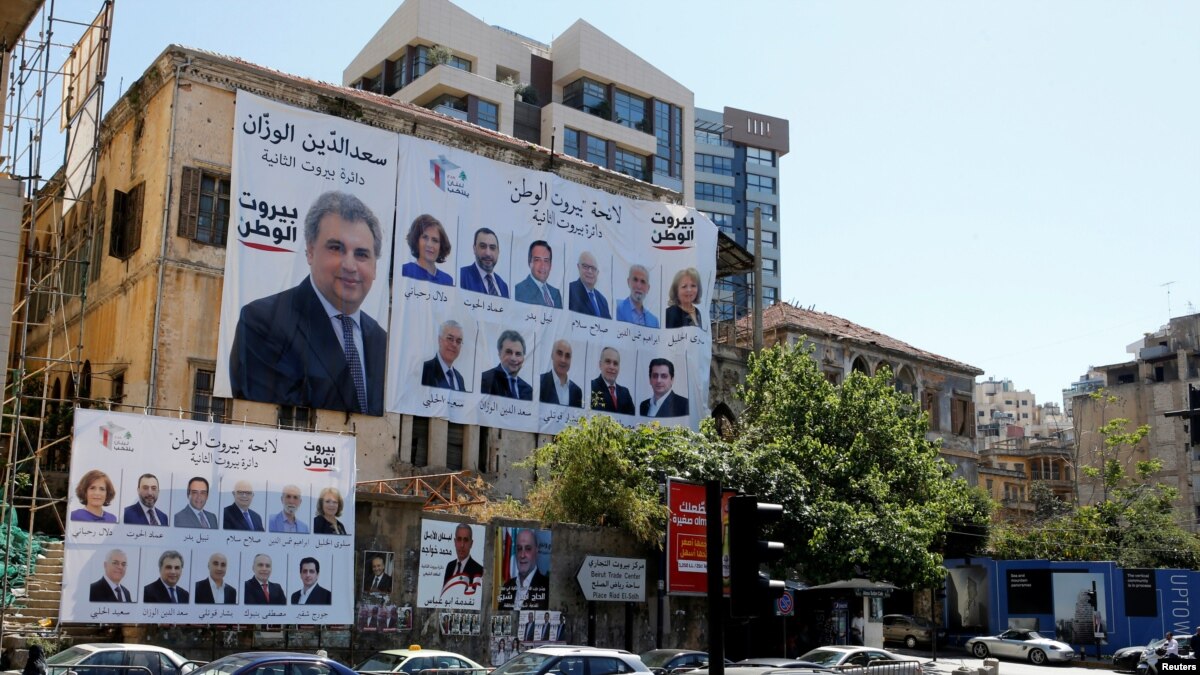
Incidents of political violence including an assault on one candidate and an attack on the office of another are casting a shadow over Lebanon’s first general election in nine years.
The May 6 vote will take place using a complicated new electoral law. It is not expected to cause major changes to the government or its policies. Analysts expect Prime Minister Saad al-Hariri will head the next cabinet.
But the law has made the outcome less predictable in some places. This has sharpened local rivalries and is encouraging parties to campaign extra hard.
“The threats to candidates, men and women, are escalating. We expect more of them as we approach the election, and we expect an increase in violence,” said Omar Kabboul, the executive director of the Lebanese Association for Democratic Elections (LADE), a group of independent electoral observers.
“The outcome of the elections is uncertain. The more uncertain the outcome, the more fear there is within the parties and the bigger the agitation in speeches.”
Some 28 years after Lebanon’s civil war, nobody expects any major strife, but the country has been plagued by repeated bouts of political instability that have weighed on its economy.
The Lebanese system divides up power according to strict sectarian quotas, with parliament’s 128 seats split evenly between Christian and Muslim groups. The flare-ups reported so far have pitted rivals from the same sect against each other.
The army intervened on Sunday night to break up a confrontation between supporters of rival Druze parties south of Beirut in which guns were fired in the air, a security source said. The standoff spiraled from a row over electoral posters.
Also on Sunday, an independent Shi’ite candidate said Hezbollah supporters beat him up in their southern Lebanon stronghold, where he is standing against the two dominant Shi’ite parties Hezbollah and Amal.
Ali al-Amin said a group of more than 30 Hezbollah supporters accosted him while he was hanging an election poster in his home village of Shaqra in Bint Jbeil district.
“I accuse... a political side, which is Hezbollah, of arranging this incident and I hold it mainly responsible,” he said, adding that the group “could not tolerate the presence of one photo or poster of a candidate who is against them”.
Ali Saleh, the pro-Hezbollah head of the local council, said it was an “individual incident” that was now in the hands of the judiciary and security forces. “Ali al-Amine is a candidate ... and every candidate has the right to practice his media campaign and his electoral campaign,” he said.
Confrontation
The heavily armed, Iran-backed Hezbollah, which gained legitimacy among many Shi’ites by fighting Israeli forces that occupied the south until 2000, has taken part in Lebanese elections since the early 1990s, enjoying an effective duopoly of the Shi’ite vote with Amal.
The parliamentary election has been postponed three times, chiefly because Lebanon’s fractious politicians could not agree on the new election law that was demanded by Christian parties.
It has redrawn constituency boundaries and introduced a new proportional representation system that experts say has been engineered to suit the dominant political players but has still left a good deal of uncertainty at the local level.
Last week, supporters of Hariri’s Future Movement attacked the offices of an electoral rival in the capital, breaking his windows, the rival candidate said.
First, his election posters were torn down, then his supporters were attacked after a rally, and then his campaign office was assaulted, prompting some volunteers to quit, said Nabil Badr.
Interior Minister Nohad Machnouk, a Future Movement member, acknowledged on television that some of the party’s supporters had carried out the attack. He said they had been provoked by Badr’s bodyguards, who had themselves assaulted a local figure.
“All the parties are tense because they don’t know the outcome of this electoral law,” said Badr. “The electoral battle will be strong in Beirut.”
Read More Local Tensions Flare up Before Lebanese Election : https://ift.tt/2qW8fAJIsrael Abandons Plan to Forcibly Deport African Migrants
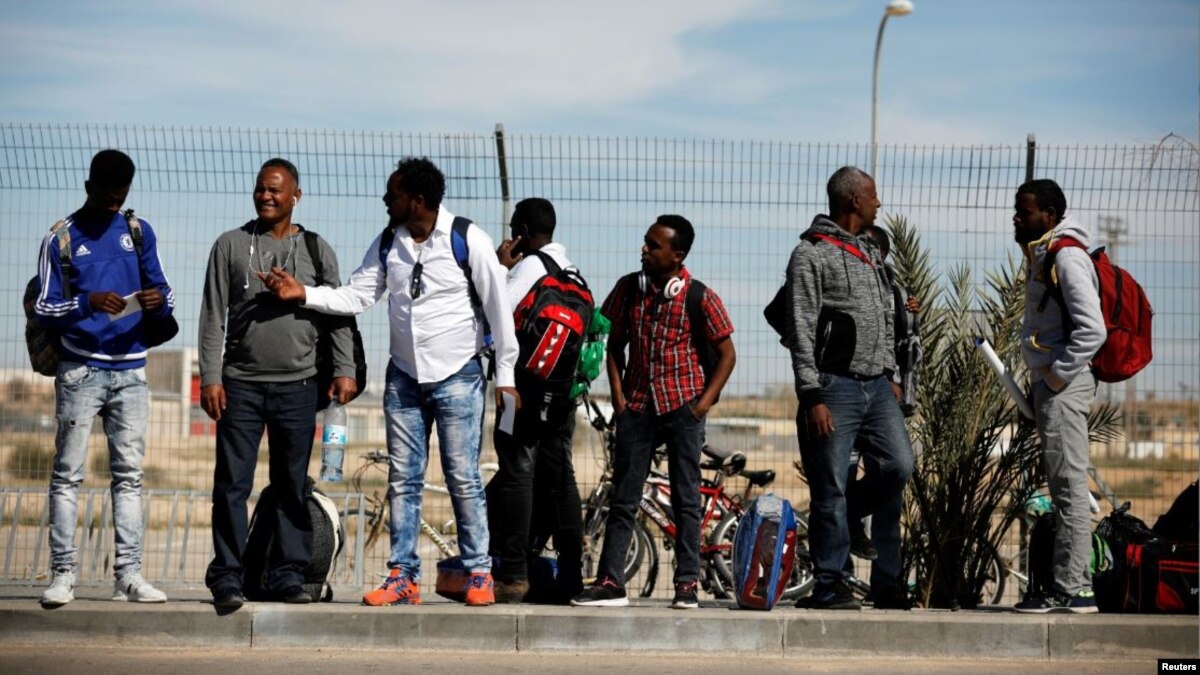
The Israeli government said on Tuesday it was abandoning a plan to forcibly deport African migrants who entered the country illegally.
The government had been working for months on an arrangement to expel thousands of mostly Eritrean and Sudanese men who crossed into Israel through Egypt's Sinai desert.
"At this stage, the possibility of carrying out an unwilling deportation to a third country is not on the agenda," the government wrote in a response to the court.
The migrants, it said, will again be able to renew residency permits every 60 days, as they were before the deportation push.
The migrants and rights groups say they are seeking asylum and are fleeing war and persecution. The government says they are job seekers and that it has every right to protect its borders.
Around 4,000 migrants have left Israel for Rwanda and Uganda since 2013 under a voluntary program, but Prime Minister Benjamin Netanyahu has come under pressure from his right-wing voter base to expel thousands more.
After leaving a U.N.-backed relocation plan a few weeks ago, Israel shifted efforts towards finalizing an arrangement to send the migrants against their will to Uganda.
A number of migrant rights groups petitioned the Supreme Court to block any such policy.
UN Rights Office: Saudi-Led Yemen Strikes Kill Dozens of Civilians
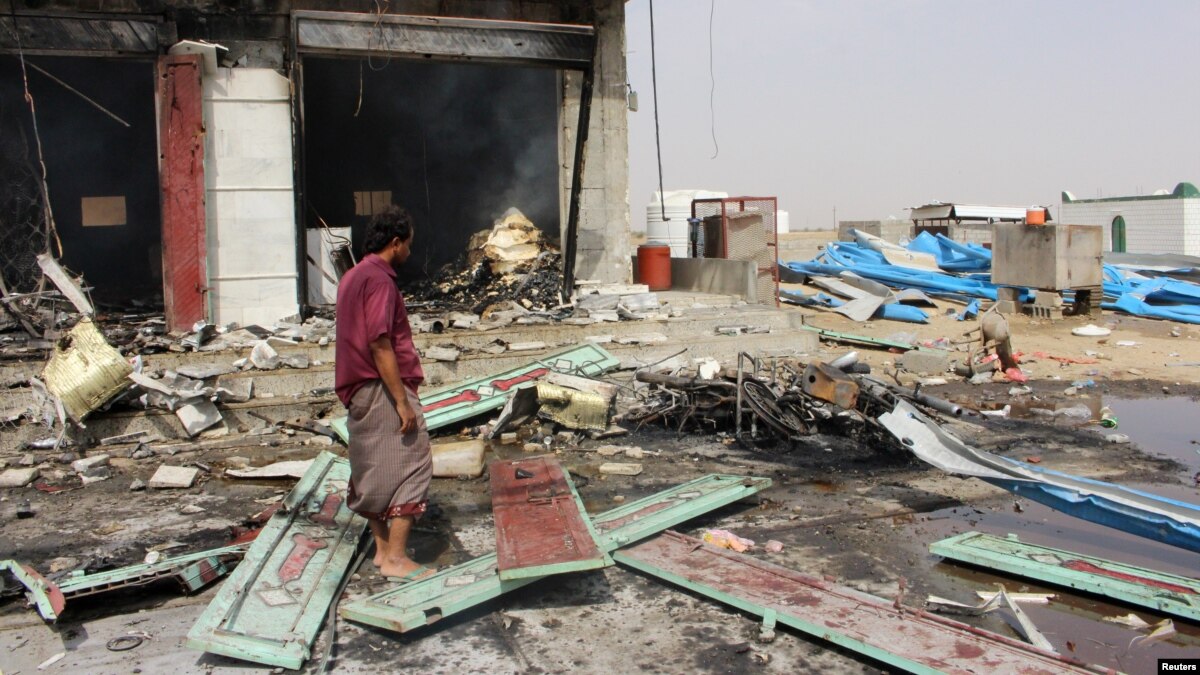
The U.N. Human Rights Office is calling for an investigation into the killings of dozens of civilians in Yemen during the past four days by Saudi-led Coalition airstrikes.
The office reports Saudi-led airstrikes killed at least 45 people, all civilians, and wounded many more, including women and children in three separate incidents.
The first attack on Friday reportedly killed 21 civilians, including five children traveling in a vehicle in a village in Taizz governorate. Two days later, human rights monitors report many people were killed and injured in two separate incidents.
U.N. Human Rights Office spokeswoman Liz Throssell said the most devastating of these occurred at a wedding ceremony. She says two coalition airstrikes destroyed a wedding tent killing at least 19 civilians and injuring some 50 others.She says the final toll of deaths and injuries may be higher.
"Local inhabitants informed our staff that the victims do not have any political affiliations, not to say that that would have made the wedding party a legitimate target.They also said that there were no military objectives in the vicinity of the targeted area at the time of the attack," she said.
Throssell told VOA she does not know whether the attacks on civilian targets resulted from mistakes or were part of deliberate actions.
"We have over the years, since March 2015 documented numerous attacks often when large numbers of civilians have been killed in cases like wedding parties or funerals where civilians gather. But it is clear that such incidents continue to shock, and that is why it is so important that there is an independent thorough investigation," said the spokeswoman.
The U.N. Human Rights Office is urging the Saudi-led coalition to fully investigate all these latest deadly attacks. It adds those found to be responsible should be held accountable and reparations should be provided to the victims.
Syrian Troops Target IS Tunnels, Trenches in Damascus
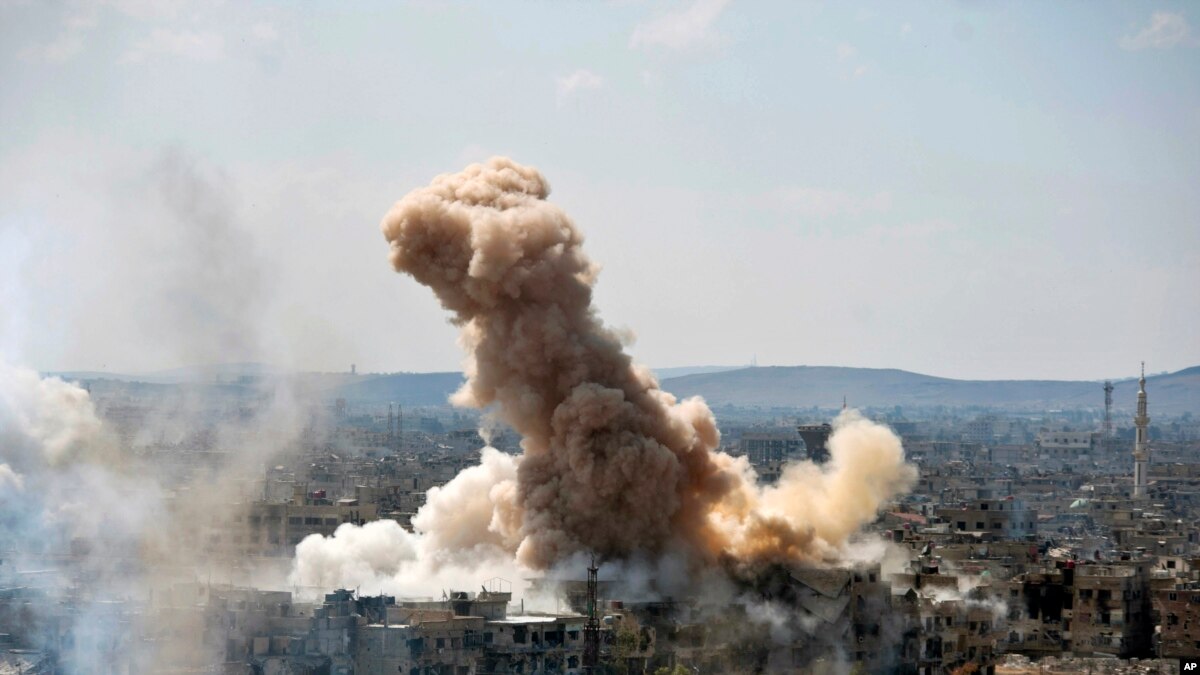
The Syrian government launched a new operation Tuesday targeting tunnels used by the Islamic State group in the capital, state TV said, while shelling by the extremists on a government-held neighborhood left at least four dead.
The TV said the aim of the operation is to destroy trenches and tunnels in the Hajar al-Aswad neighborhood and the nearby Palestinian refugee camp of Yarmouk, which is also mostly controlled by the extremists.
IS fighters in Hajar al-Aswad fired a shell on the nearby government-held neighborhood of Nahr Aisha, killing four people and wounding 15, state TV said. The Britain-based Syrian Observatory for Human Rights said the shelling killed five and wounded 17.
A group of journalists taken to the adjacent neighborhood of Qadam on Tuesday witnessed intense shelling and airstrikes on IS positons in the camp and Hajar al-Aswad. The crackle of gunfire echoed from the heavily damaged area.
The area in southern Damascus is the last part of the capital not controlled by President Bashar Assad's forces. Other insurgents in the area, including an al-Qaida-linked group, have said they would relocate to rebel-held regions in northern Syria.
"The operation will continue until its goal is achieved," a Syrian military officer told reporters in Qadam, speaking on condition of anonymity under regulations.
He said the army is also working on separating IS-held areas in Hajar al-Aswad and Yarmouk from the nearby rebel-held suburbs of Beit Sahem, Babila and Yalda.
Tuesday's fighting focused on the Joura area in Hajar al-Aswad, from where thick smoke rose up into the sky.
The Observatory, an opposition-linked war monitoring group, said since the fighting began on Thursday, 15 troops and pro-government gunmen and 19 IS fighters have been killed. It said dozens were wounded on both sides.
The head of the U.N. agency for Palestinian refugees, UNRWA, said in a statement that it is deeply concerned for the fate of thousands of civilians, including Palestinian refugees, after days of fighting in Yarmouk, a built-up residential area.
UNRWA's commissioner-general, Pierre Krahenbuhl, said the agency estimates there were about 6,000 Palestinian refugees in Yarmouk and about 6,000 in the surrounding areas, before the latest round of fighting began on Thursday.
"The humanitarian situation has long been very harsh and is rapidly deteriorating further, with supplies of food and medicine running low," Krahenbuhl said. "There is no running water and very little electricity. Health care options are limited and there are no doctors remaining in the area."
He said UNRWA is prepared to open temporary shelters and provide relief and humanitarian assistance.
Mummified Body Found in Iran Could Be Father of Last Shah
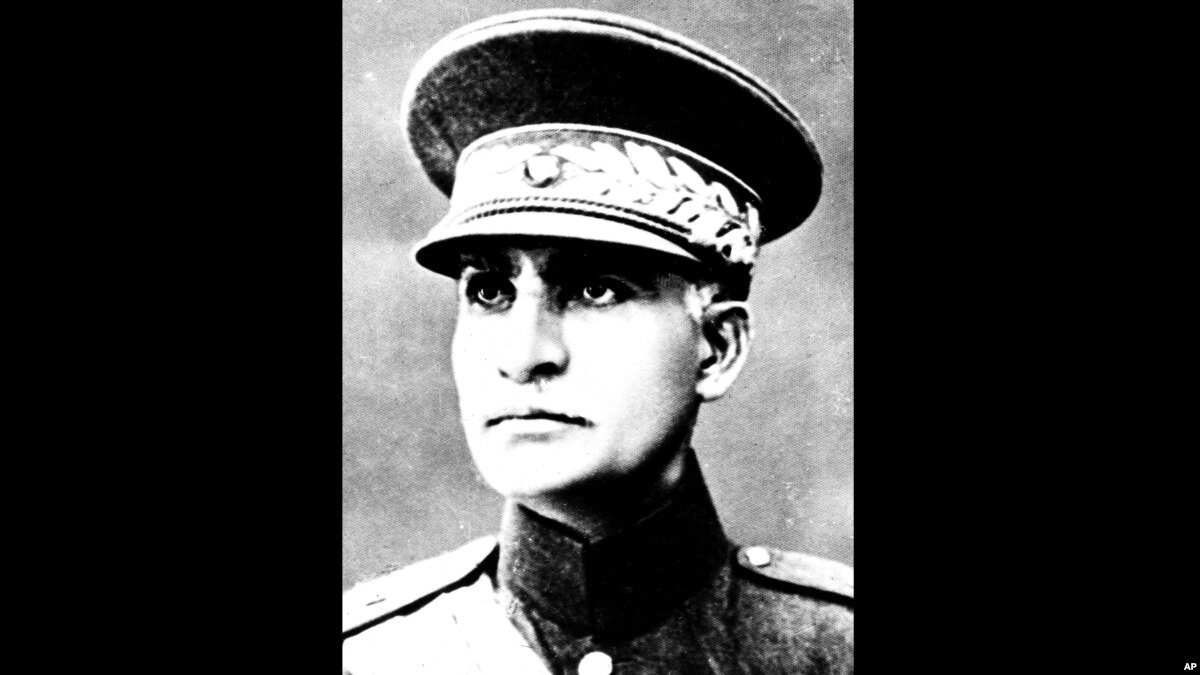
A mummified body discovered near the site of a former royal mausoleum in Iran may be the remains of Reza Shah Pahlavi, the founder of the Pahlavi dynasty and the father of the country's last shah.
The recent find of the gauze-wrapped body — and the speculation it triggered — puts new hurdles in the way of the Islamic Republic's efforts to fully erase the country's dynastic past, which includes the jack-hammered destruction of the autocrat's tomb immediately after the 1979 revolution.
Yet, as disaffection and economic problems grow ahead of the Islamic Revolution's 40th anniversary, mystique around Iran's age of monarchies persists even with its own history of abuses.
Reza Shah's grandson, the U.S.-based exiled Crown Prince Reza Pahlavi, already tweeted about it as forensic experts in Iran try to determine whose body they found.
Construction workers discovered the mummified remains while working at the Shiite shrine of Abdul Azim, whose minarets once rose behind Reza Shah's own mausoleum. A digger pulling away dirt and debris uncovered the body, according to the semi-official ISNA news agency.
Pictures of the body, as well as construction workers posing with it, quickly ricocheted across social media in Iran.
A spokesman for the shrine dismissed the idea of a mummy being found there. However, Hassan Khalilabadi, the head of Tehran City Council's cultural heritage and tourism committee, was quoted by the state-run IRNA news agency on Monday that it's "possible'' the mummy is the body of Reza Shah.
Authorities say they'll need to conduct DNA tests to confirm whose body it is.
State television has yet to report on the find, likely due to complications that mentioning the Pahlavis can entail.
State media typically refer to the Persian dynasties, including the Pahlavis, as "despotic,'' focusing on the abuses of the monarchy's feared SAVAK intelligence agency and their once-lavish lifestyles.
Reza Shah's own rise gave birth to modern Iran itself, then still called Persia until he ordered foreign diplomats to cease using the name. He came to power in 1925, ruling as an absolute autocrat who used taxes and the country's burgeoning oil revenues to rapidly modernize the nation.
His decisions echo today, particularly his 1936 decree banning women from wearing long, flowing black robes known as chadors. He ordered men to wear Western clothes and bring their wives to public functions with their hair uncovered, borrowing from the secularization of Turkey's first President Mustafa Kemal Ataturk, a contemporary.
The ban became a source of humiliation for some pious Muslim women in the country. Shiite clerics, angry over his secular beliefs, purges and mass arrests of opponents, held grudges that would foment the coming revolution. Controversies over the chador and hijab persist in Iran today .
Iran's strong trade ties with Germany, Reza Shah's push for neutrality amid the coming of World War II and Western fears over its oil supplies falling to the Nazis ultimately sparked a Russian-British invasion of the country in 1941. Reza Shah abdicated in favor of his son, Mohammad Reza Pahlavi, at the insistence of the occupying British forces.
Reza Shah ended up in South Africa, dying there in 1944. His body was taken to Cairo, mummified and held for years before returning to Iran. A grand mausoleum near Tehran held his body for years, which then-President Richard Nixon visited in 1972.
After 1979, however, Islamists viewed the mausoleum as an affront.
Iranian cleric Ayatollah Sadegh Khalkhali, who ordered the executions of hundreds after the revolution, led a mob of supporters who used sledgehammers, jack hammers and other tools to demolish the mausoleum.
Khalkhali later would write in his memoirs that he believed the shah's family took Reza Shah's body when they fled the country. The shah's family, however, maintained the body remained in Iran. His son Mohammad Reza Pahlavi was buried in Cairo after dying of cancer in 1980.
Today, Iran's youth remain fascinated by the time before the revolution. Television period pieces have focused on the Pahlavi dynasty, including the recent state TV series "The Enigma of the Shah,'' the most expensive series ever produced to air in the country. While incorporating romances or mobsters into the tales, all shows uniformly criticize the royal court.
Reza Shah's grandson, Reza Pahlavi, has seen his profile rise following the election of President Donald Trump, who appears to hold the future of the Iran nuclear deal in the balance. From exile, the crown prince has agitated for an end to Iran's theocracy — though gauging national sentiment about restoring the monarchy remains impossible.
Pahlavi took to Twitter on Monday night to tell Iranian officials he is watching what they will do next with the body.
"I warn the responsible authorities not to hide anything,'' he wrote.
Read More Mummified Body Found in Iran Could Be Father of Last Shah : https://ift.tt/2HosMouWFP: Battle for Syria's Idlib Would Trigger Humanitarian Nightmare
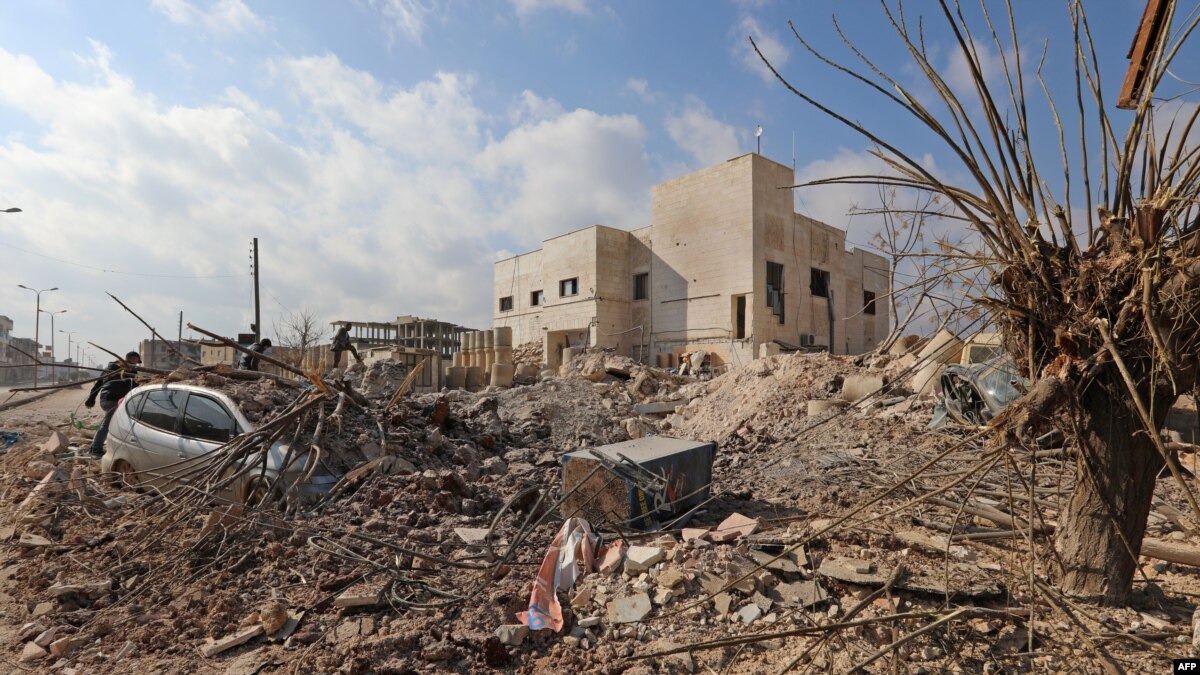
A senior World Food Program official warns that a Syrian government offensive to wrest the besieged province of Idlib from rebel armed groups would be catastrophic and trigger a humanitarian crisis.
Now that the besieged enclave of eastern Ghouta has fallen, Idlib remains the last rebel stronghold in Syria. Troops loyal to Syrian President Bashar al-Assad, backed by Russian air forces, are advancing on Idlib, which is home to 2 million people.
One half of this population is composed of internally displaced people from formerly besieged territories such as eastern Aleppo, Homs and eastern Ghouta. As part of truce agreements with the Syrian government, rebels and their families have been taken to Idlib.
The World Food Program country director in Syria, Jakob Kern, says Idlib has about 100,000 armed fighters from these different places. He says the fighters do not comprise one homogeneous army. Rather, they represent different rebel factions that are fighting each other. Caught in between these groups, he says, are civilians.
"I am not speculating anymore what can happen in Idlib. But, it certainly will be the next big battle and I just hope for the sake of the 2 million people that are living there, that we find a political solution because if we do that again, if we see the same pattern again, it is going to be a much bigger catastrophe than we have seen in east Aleppo," he said.
Kern warns a battle for Idlib will trigger a humanitarian nightmare. He says he does not know where people will flee as the border between Idlib and Turkey is closed. Kern says delivering food to the war victims will not be an issue as WFP has a system worked out with local partners for distributing rations.
But, Kern tells VOA, providing proper shelter for hundreds of thousands of displaced people is very difficult. He says cramming thousands of people into schools and other structures without latrines and such basic necessities as blankets and mattresses is dehumanizing.
Kern says 2 million people on the move from Idlib would stretch the capacity of what the WFP and other aid agencies would be able to do.
Monday, April 23, 2018
Report: Egypt's Sinai Battle Keeps Food, Supplies From Thousands
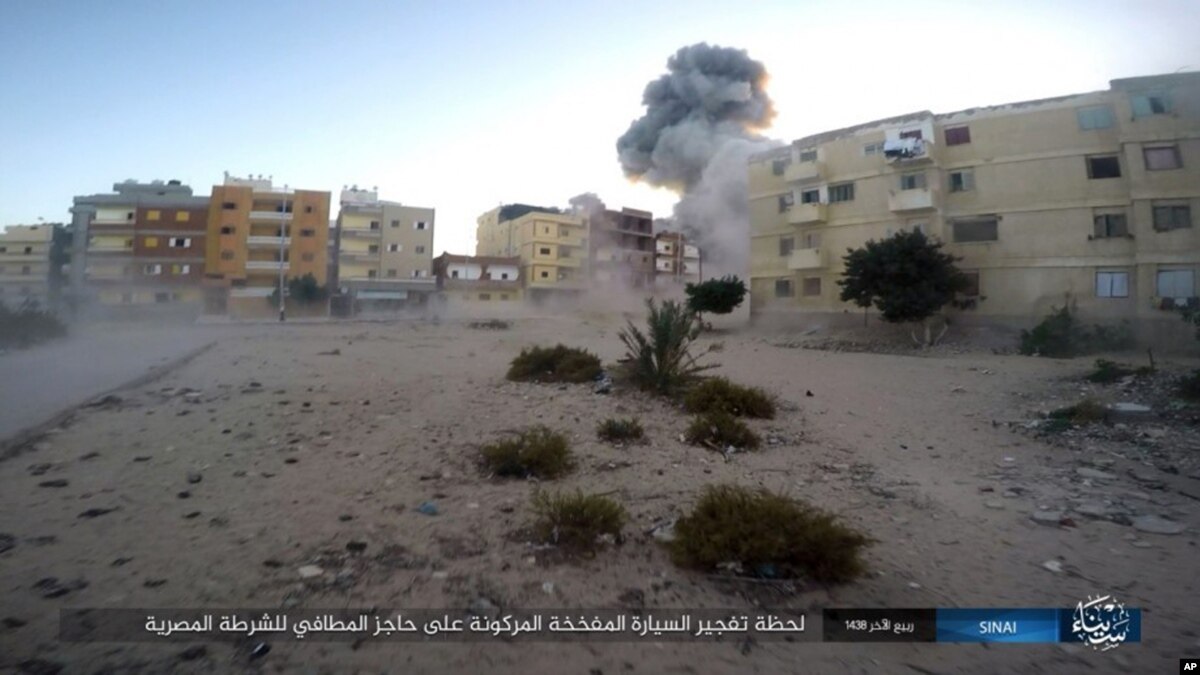
An Egyptian military campaign to defeat Islamic State militants in the northern Sinai Peninsula is choking essential food and medical supplies to thousands of residents in the remote desert region, a report by Human Rights Watch said on Monday.
The New York-based group warned of a wider humanitarian crisis if North Sinai continued to be cut off from the Egyptian mainland, saying army’s actions “border on collective punishment.”
The army launched a wide operation in February to crush jihadists who have waged a years-long insurgency that has killed hundreds of soldiers, police and residents. Airstrikes and raids have killed scores of suspected militants since then, the military says, as it imposes curfews and tight movement restrictions around towns in North Sinai.
Response in the works
The military said it was preparing a response to the HRW report. It has distributed food to Sinai residents during the highly-publicized campaign and says it is winning the battle against jihadists. International news outlets are prevented from traveling to North Sinai to report.
Residents said food supplies, medicine and fuel were insufficient and that movement restrictions meant most people were unable to leave the region, HRW reported.
“A counter-terrorism operation that imperils the flow of essential goods to hundreds of thousands of civilians is unlawful and unlikely to stem violence,” HRW’s Middle East and North Africa director Sarah Leah Whitson said.
The report said authorities had banned the sale of petrol and cut communication lines, water and electricity in some areas of North Sinai including near the border with the Gaza Strip.
Residents told Reuters last month they often waited for hours for bread handouts which were not guaranteed to arrive.
President Sisi draws mixed reviews
Defeating Islamists and restoring security after years of unrest that followed Egypt’s 2011 popular uprising has been a promise of President Abdel Fattah al-Sisi, who was re-elected in March in a landslide victory against no real opposition.
Sisi’s critics say he has presided over Egypt’s worst crackdown on dissent. Supporters say such measures are needed to bring stability and improve the country’s hard-hit economy.
In Sinai, analysts and foreign diplomats say heavy-handed military tactics including airstrikes and demolitions of populated areas have failed to beat the Islamist insurgency.
Houthis: Saudi-Led Airstrike in Yemen Killed Their Political Leader
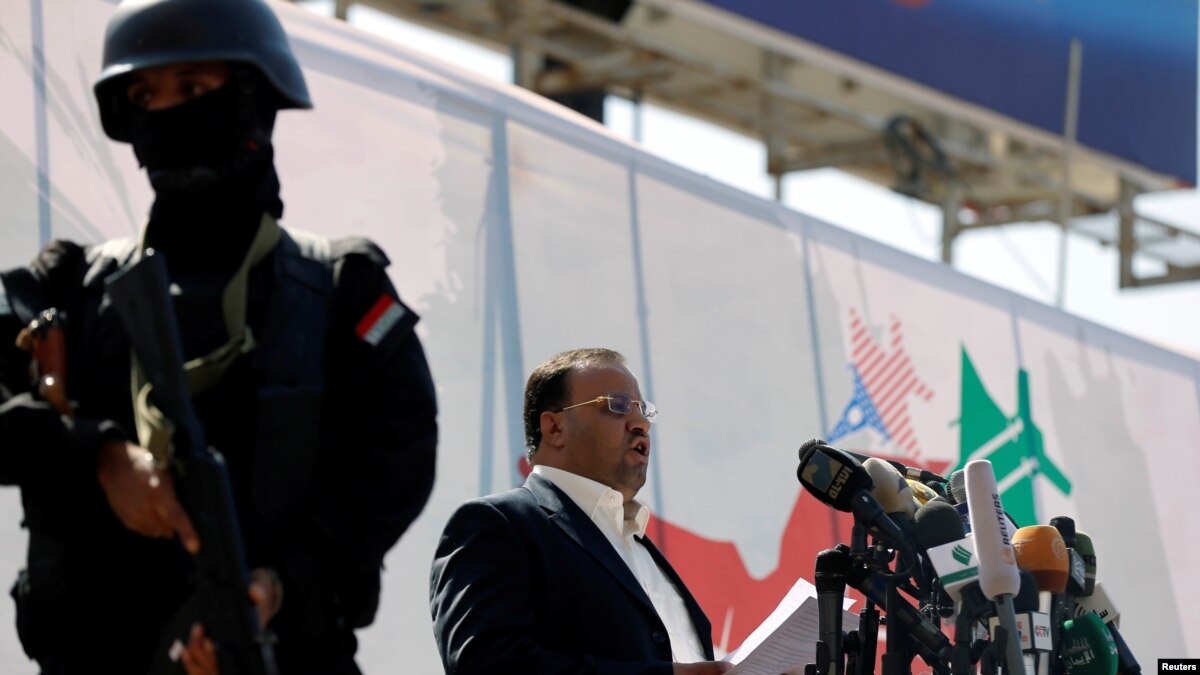
The Iran-allied Houthi rebels in Yemen said Monday that their political leader, Saleh al-Sammad, was killed last week in a Saudi-led airstrike.
Sammad was the most senior Houthi official to be killed by the coalition since it intervened in Yemen's civil war in 2015 to try to defeat the Houthis after they drove the internationally recognized government into exile in Saudi Arabia.
Sammad was considered to be second on the coalition's list of targets in Yemen, after the top Houthi leader, Abdel-Malek al-Houthi. A Saudi-owned broadcaster said there had been a $20 million bounty for information leading to Sammad's capture.
The rebels said Sammad was "martyred" in the eastern province of Hodeida last Thursday.
"This crime won't go unanswered," rebel leader Houthi said.
More than 10,000 people have been killed in the civil war. In the latest violence late Sunday, the rebels said a Saudi airstrike hit a wedding party that killed at least 20 people, including the bride.
As Syria War Grinds On, UN-EU Conference Aims To Revive Peace Process
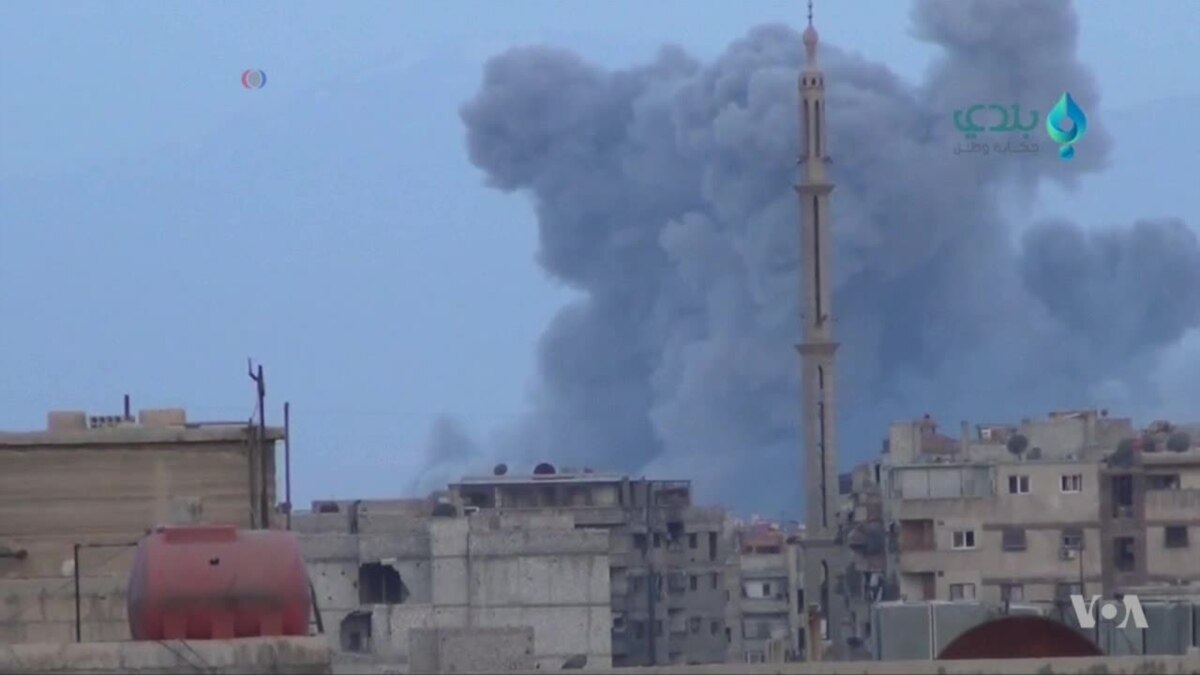
Efforts to find a political solution to the Syrian war resume this week as representatives and ministers from 85 countries gather in Brussels for a two-day conference Tuesday. Its stated aim is to mobilize humanitarian aid and boost support for the U.N.-led Geneva peace process. But with Syrian government forces - backed by Russia - seemingly determined to secure a military victory, hopes for a diplomatic breakthrough are low. Henry Ridgwell reports from London.
Jailed Egyptian Photographer Wins UNESCO Press Freedom Prize
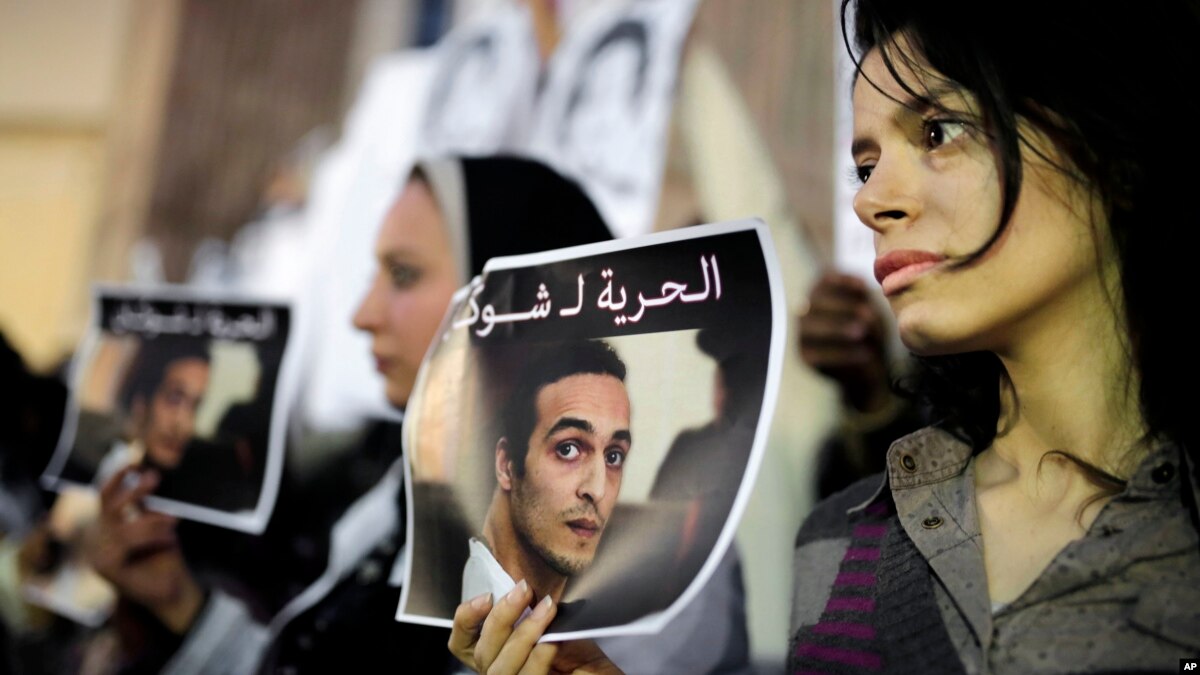
The United Nations' cultural agency has ignored warnings from Egypt and awarded the World Press Freedom prize to an imprisoned Egyptian photographer.
A jury on Monday awarded the honor to Mahmoud Abu Zeid, known as Shawkan, who has been in jail since he was arrested in Cairo in August 2013 for covering a demonstration at Rabaa Al-Adawiya Square.
Egypt's Foreign Ministry strongly warned UNESCO against the move Sunday, saying that Shawkan faces terror-related charges.
The U.N. Working Group on Arbitrary Detentions says Shawkan's arrest is arbitrary and his continued detention infringes his human rights.
Jury president Maria Ressa said the award, which recognizes the promotion of press freedom especially in the face of danger, “pays tribute to his courage, resistance and commitment to freedom of expression.”
Education in Conflict Zones: An Unmet Need
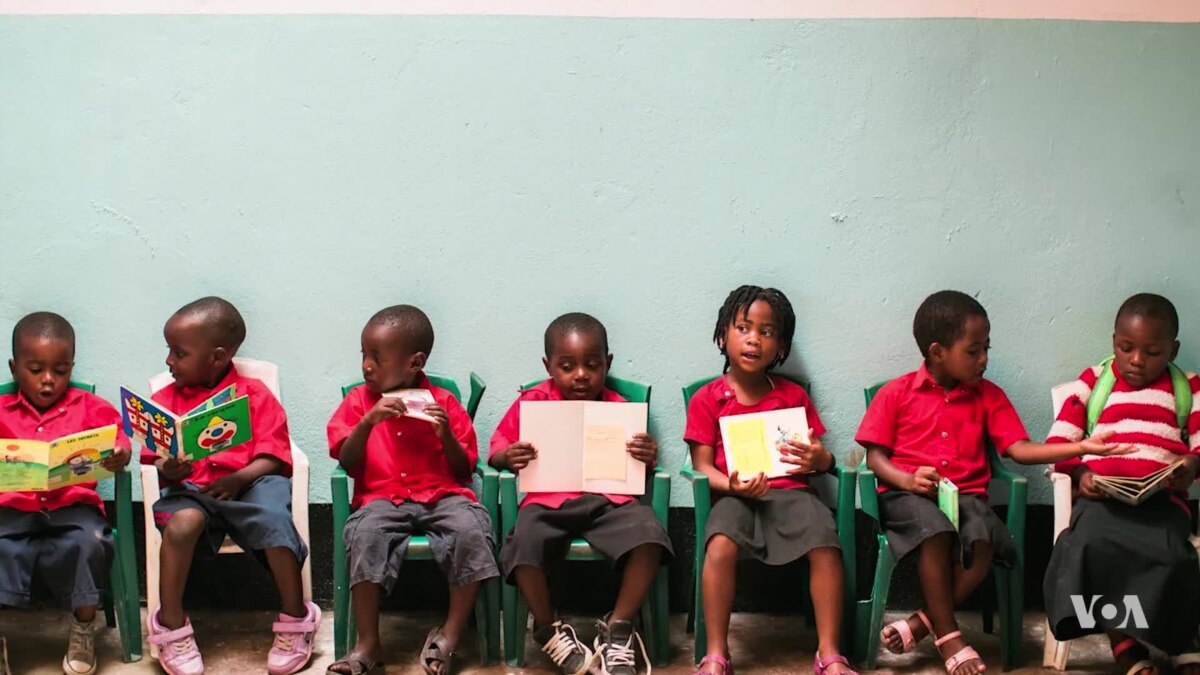
The California-based charity Justice Rising is working to educate youngsters in conflict zones, especially the strife-torn eastern section of the Democratic Republic of Congo. It is one of many organizations struggling to meet a need that is largely unmet in trouble spots worldwide, according to the the United Nations Children’s Fund, UNICEF.
Justice Rising built its first school in eastern Congo in 2015 and has since built six others, employing 60 teachers and administrators and serving more than 1,600 students.
Eastern Congo was ravaged by fighting from 1996 through 2003, and flare-ups and killings continue.
“In planting one of these schools in a community that has been torn apart by war,” said founder Cassandra Lee, “you can see a decrease of child soldiers; you can see young girls less likely to be taken as a child bride and in turn become child mothers. You can see community health increase.”
UNICEF says 27 million children are out of school in conflict zones such as Syria, South Sudan, Iraq and Yemen, or areas divided by religion and resources, such as Nigeria and Niger.
The gap in children’s education leaves a void in their social development, said Linda Jones, senior education specialist with UNICEF, noting it has an impact on the society as well. “It’s also about humanitarian development, the development in the long-term of a country.” She said that getting children into schools contributes to a nation’s stability.
Schools can be a catalyst for change, said Cassandra Lee. “If we cluster the schools,” she said, “have multiple schools in a community, we can see them come out of war and into a culture of peace.”
Lee became interested in the issue as a 10-year-old when she learned how conflict uprooted the lives of children. Years later, she moved to South Sudan and Uganda and traveled to eastern Congo, where she was moved by personal stories that she heard.
Cassandra met her husband, Edison, in Africa, where he worked as a business consultant. Together, they are trying to extend the reach of the charity, with a goal of opening 40 schools by 2020. They are also forging partnerships with groups in the Middle East to expand their geographic focus. “In Syria and Iraq,” said Edison Lee, “we’re really trying to empower local organizations that are already doing great work, supporting them financially or sponsoring their programs.”
Less than 4 percent of global humanitarian appeals is directed at funding education, said Linda Jones of UNICEF. The U.N. agency launched an appeal this year for $900 million to aid education in countries affected by conflict and natural disasters. UNICEF says it will spend one billion dollars a year over the next four years on education.
Jones says the programs need to be flexible. “We have that with examples in Afghanistan,” she said, “with community schools where the schools reach out to the village where the children are,” in effect taking classrooms to the children. “There are also programs with learning through radios,” she added, and using games on tablet computers to hone skills in arithmetic.
Jones has worked in Somalia, where some solutions were low-tech. “Children had libraries brought to them on the backs of camels,” she said, and, “The librarian walked with the camel from place to place...children had opportunities to learn to read different books.”
Both large and small organizations face the challenge of scaling up their operations to meet the need, which UNICEF says is growing. “How can we see this impact touch not just a few hundred lives every year?” asks Cassandra Lee of her group’s schools in Congo, “but how can this touch thousands?”
Without education, say UNICEF officials, poverty and instability can become entrenched, harming successive generations.
Read More Education in Conflict Zones: An Unmet Need : https://ift.tt/2JinMlREducation in Conflict Zones: An Unmet Need

A California charity is helping to educate youngsters in conflict zones, especially the strife-torn eastern section of the Democratic Republic of Congo. As VOA's Mike O’Sullivan reports, the group Justice Rising is attempting to meet a need that is largely unmet in trouble spots worldwide.
Iran Threatens to Resume Nuclear Program If US Breaks Deal
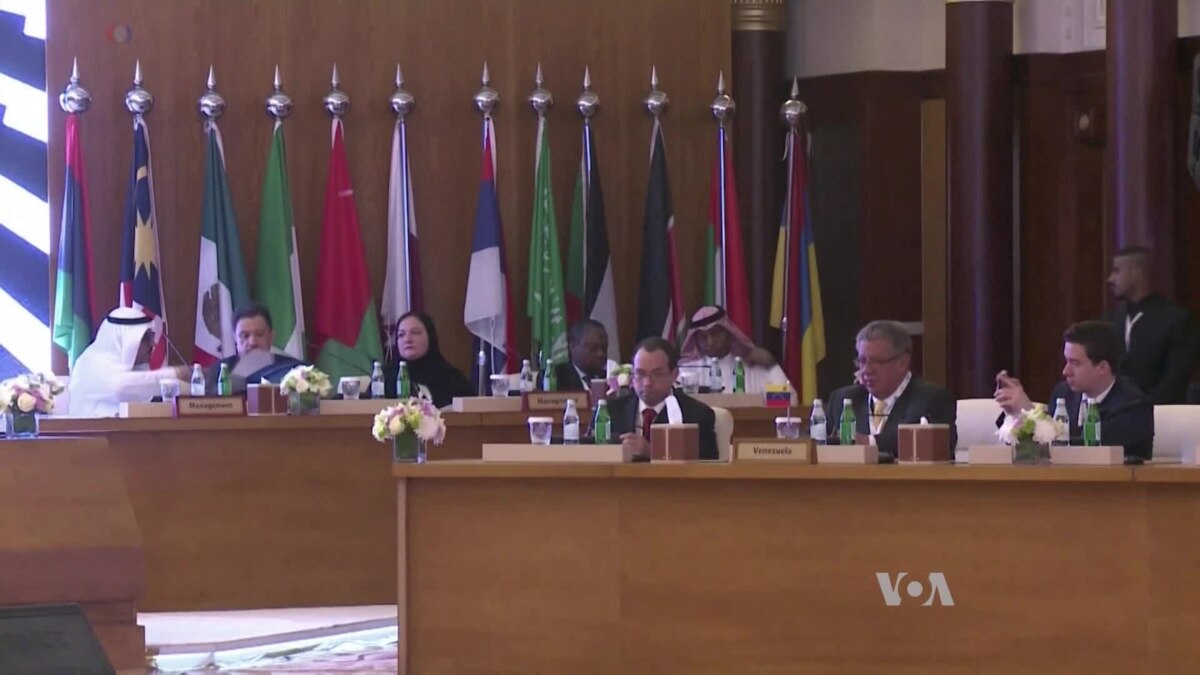
Iranian Foreign Minister Mohammad Javad Zarif says his country is prepared to resume its nuclear program if U.S. President Donald Trump breaks the 2015 nuclear deal. Trump has criticized the agreement made between Iran and six other nations, including the United States, and said he would not recertify Iran's compliance by the due date, May 12, if it is not "fixed." Trump's French and German counterparts warn that an imperfect deal with Iran is better than none. VOA's Zlatica Hoke reports.
Sunday, April 22, 2018
11 Migrants Die, 263 Rescued off Libya Coast
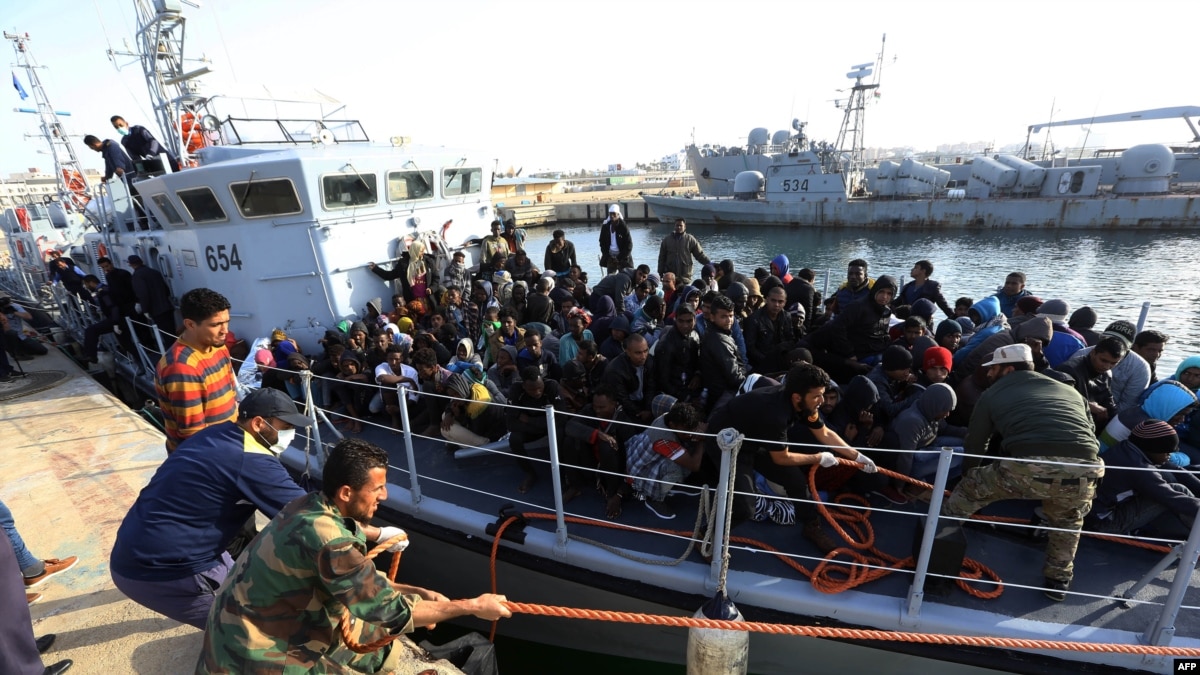
The Libyan navy said it has recovered the bodies of 11 migrants and rescued 263 others in two separate operations off Libya's western coast.
The migrants were from various sub-Saharan African countries, he said.
Libya is the most common departure point for migrants trying to reach Europe by sea. More than 600,000 crossed the central Mediterranean to Italy in the past four years, the vast majority from Libya.
The United Nations migration agency said through mid-April of this year, 18,575 migrants and refugees arrived in Italy, Greece, Cyprus and Spain by crossing the Mediterranean Sea.
The International Organization for Migration said that is less than half of last year’s pace.
More notable is the steep decline this year, to 9 percent, of the number of arrivals in Europe from 2016, which exceeded 200,000.
And yet, some of these attempts to flee conflict and poverty proved fatal. Last year alone, 3,116 people died attempting the crossing, according to the IOM, including 2,833 from Libya.
The conflict-riven country is regularly singled out for the exploitation and ill-treatment of migrants from sub-Saharan Africa.
Turkey Opposition OKs Party Switch in Challenge to Erdogan
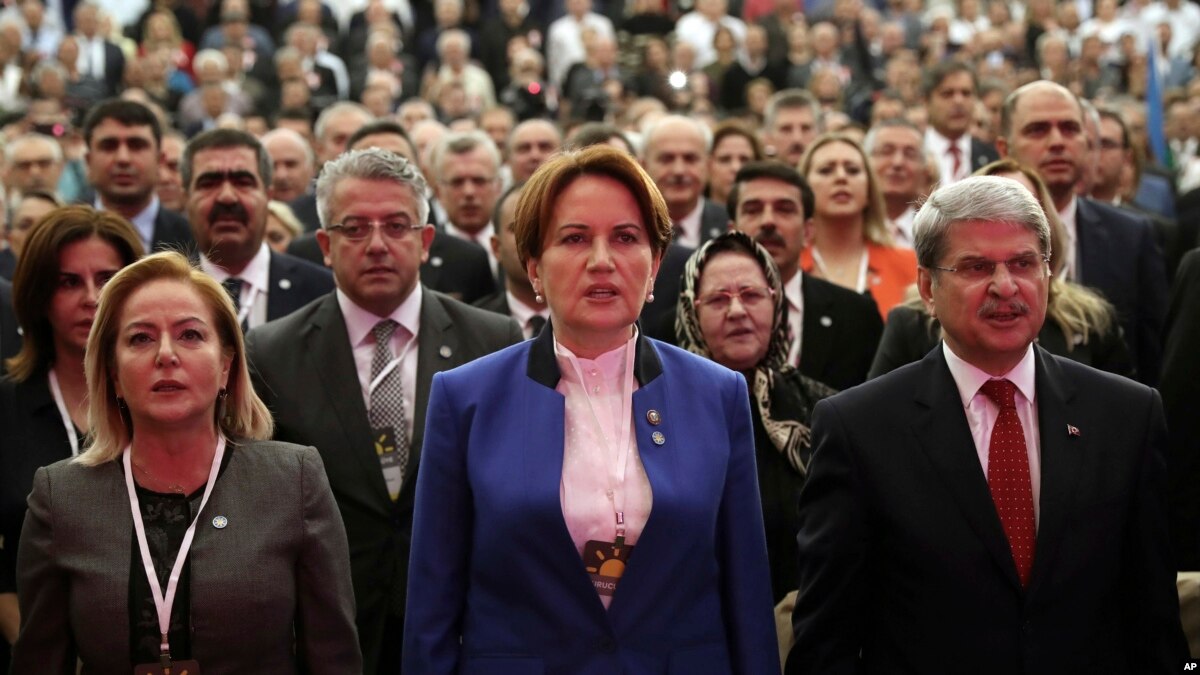
More than a dozen Turkish opposition lawmakers switched parties Sunday in a show of solidarity as President Recep Tayyip Erdogan's rivals scramble to challenge him in a surprise snap election that could solidify his rule.
A year ago, Erdogan narrowly won a referendum to change Turkey's form of government to an executive presidency, abolishing the office of the prime minister and giving the president more powers. The change will take effect after the next elections.
The snap elections, called for June, caught Turkey off guard and come as the opposition is in disarray as it struggles to put forward candidates and campaign plans. The elections were initially supposed to take place in November 2019.
Officials from the pro-secular Republican People's Party, or CHP, said 15 of its lawmakers would join the Iyi Party. The CHP, which is the main opposition party, said the decision was borne out of "democratic disposition.''
The center-right Iyi Party, established last fall, has been facing eligibility issues before the June 24 presidential and parliamentary elections, including not having enough seats in parliament.
The Iyi Party, which means "Good Party," now has 20 lawmakers in parliament, enough to form a political group, satisfying an eligibility requirement. It wasn't immediately clear if they would be asked to fulfill other requirements, including establishing organizations in half of Turkey's provinces and completing its general congress, all to be completed six months before voting day.
But the party said it had already fulfilled those requirements as well.
That timing has posed a challenge after Erdogan agreed Wednesday to hold the elections more than a year ahead of schedule.
Iyi Party founder Meral Aksener, a former interior minister, is considered a serious contender against Erdogan and has announced her candidacy. She defected from Turkey's main nationalist party allied with Erdogan, whose leader Devlet Bahceli called for the early elections.
Aksener, 61, can run for the presidency even without her party, if she can get 100,000 signatures from the public.
Turkey's electoral board has yet to announce the presidential candidates and parties eligible to run.
Thousands of Displaced in Southern Libya in Desperate Need of Help
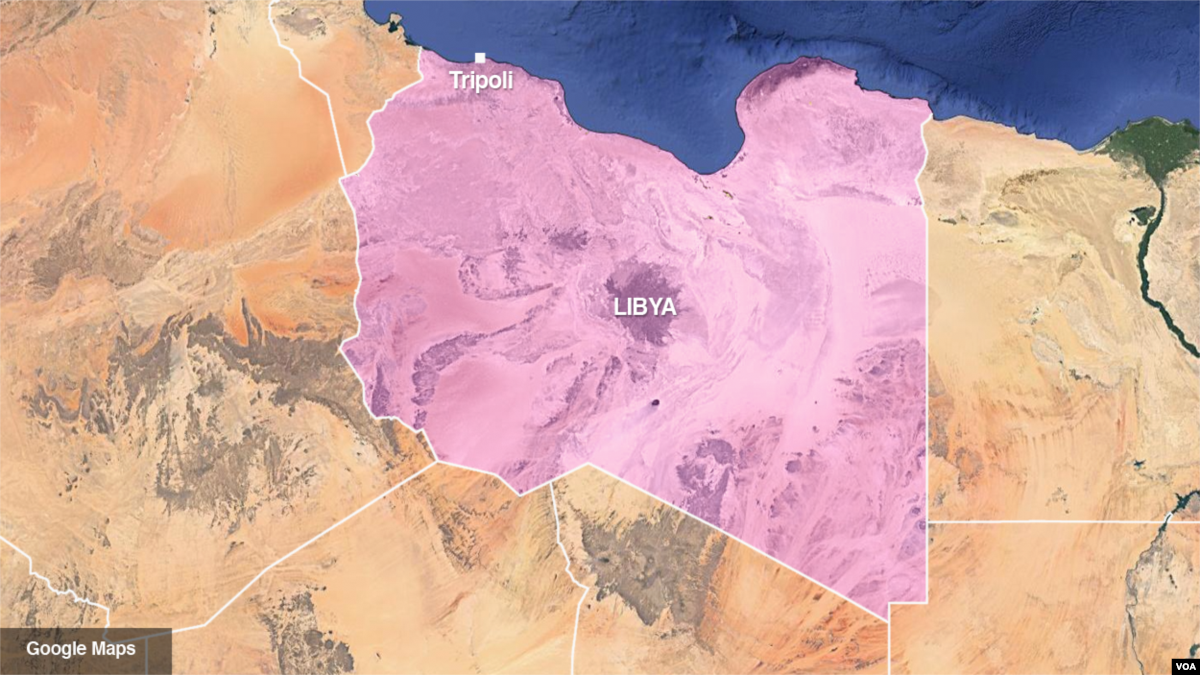
The U.N. refugee agency is appealing to armed groups in southern Libya to allow humanitarian access to thousands of people displaced by fighting to provide urgently needed relief.
Recent deadly clashes between armed groups in and around the southern Libyan city of Sabha have forced an estimated 1,900 families or more than 13,000 people to flee their homes.
U.N. refugee spokesman, Andrej Mahecic says humanitarian help in this region of Libya is desperately needed.
“The displaced Libyan population in the south badly needs adequate shelter and basic household items including hygiene kits, sleeping mats, mattresses and kitchen sets," he said. "To make matters worse, humanitarian access in this part of Libya has been restricted for weeks and the situation remains extremely volatile. Many have sought refuge in local schools, hospitals and other public buildings.”
Libya has been riven by division and conflict since the 2011 Arab Spring uprising, which toppled former dictator Moammar Gadhafi. Rival governments and multiple armed factions are keeping the society in a state of perpetual chaos. Tribal fighting is a regular and disruptive occurrence in the region of Sabha city, some 760 kilometers south of the capital Tripoli.
Mahecic says the UNHCR was able to seize, what he calls a window of opportunity this past week to deliver urgently needed relief items to hundreds of displaced families in the city of Murzuk. This town, one of the hubs of Libya’s modern slave trade, is located about 135 kilometers south of Sabha.
Conflict has uprooted more than one-half million people throughout Libya. Mahecic says the UNHCR has increased its resources by 300 percent in recent months so that it can provide more humanitarian assistance to more people in need.
Syrian Military Pummels IS-Held Districts in Damascus
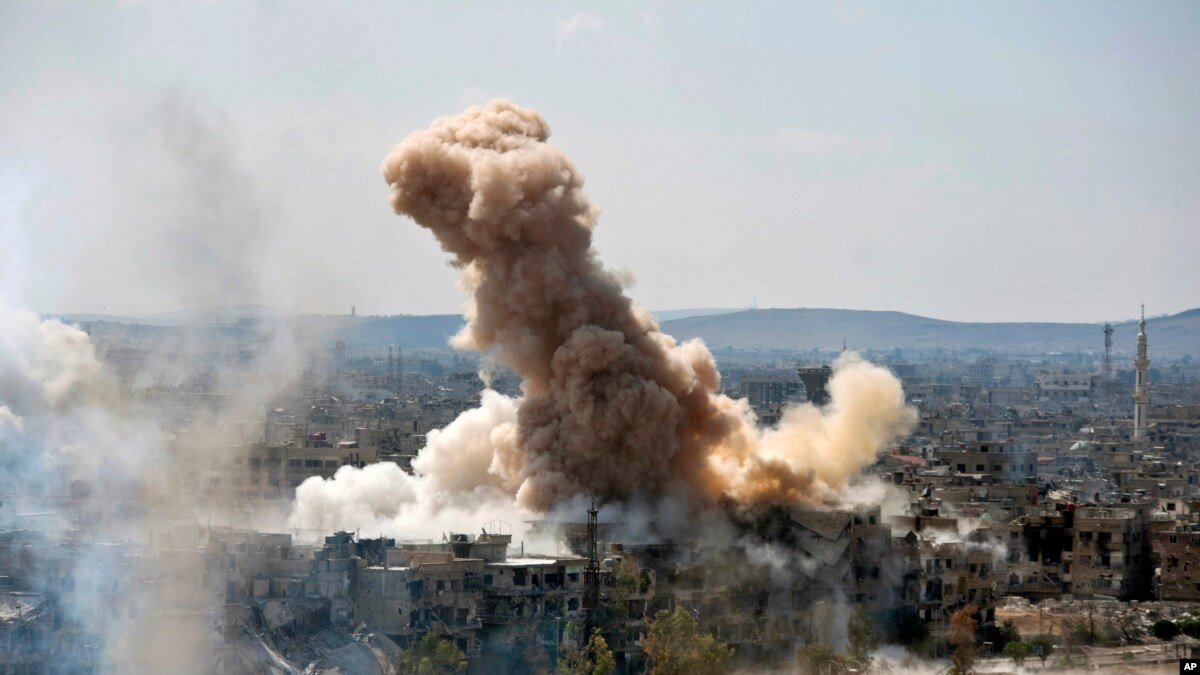
Syrian government forces used warplanes, helicopters and artillery on Sunday to pound districts of the capital held by the Islamic State group, in a bid to enforce an evacuation deal reached with the militants earlier in the week.
The militants agreed to give up their last pocket in southern Damascus on Friday but have yet to begin surrendering to government forces and relocating to IS-held areas elsewhere in the country.
State-run Ikhbariya TV showed thick gray smoke billowing from the IS-held Hajar al-Aswad neighborhood Sunday, and government warplanes streaking overhead amid heavy bombardment of the area. Hundreds of IS fighters and allied militants are holed up in Hajar al-Aswad and the nearby Yarmouk Palestinian refugee camp.
Residents of Damascus reported hearing loud booms throughout the night and Sunday morning.
President Bashar Assad has accelerated his military campaign to retake all remaining enclaves in the capital and surrounding areas. The IS-held areas in southern Damascus are the last holdouts, after rebels evacuated the eastern Ghouta suburbs following a fierce government offensive and an alleged poison gas attack in the town of Douma.
Chemical weapons inspectors collected samples from Douma on Saturday, two weeks after the suspected gas attack there prompted retaliatory strikes by Western powers on the Syrian government's chemical facilities.
The site visit, confirmed by the Organization for the Prohibition of Chemical Weapons, would allow the agency to proceed with an independent investigation to determine what chemicals, if any, were used in the April 7 attack that medical workers said killed more than 40 people.
Douma was the final target of the government's sweeping campaign to seize back control of eastern Ghouta from rebels after seven years of revolt. Militants gave up the town days after the alleged attack.
The Syrian government and its ally Russia denied responsibility for the suspected chemical attack.
Meanwhile, rebels have begun evacuating three towns in the eastern Qalamoun region in the Damascus countryside.
Al-Ikhbariya TV said on Saturday that 35 buses left the towns of Ruhaiba, Jayroud, and al-Nasriya, carrying hundreds of rebels and their families to opposition-held territory in northern Syria.
The station said the evacuations would continue for three days.
Iran Arrests Ex-Prosecutor Dubbed ‘Torturer of Tehran’
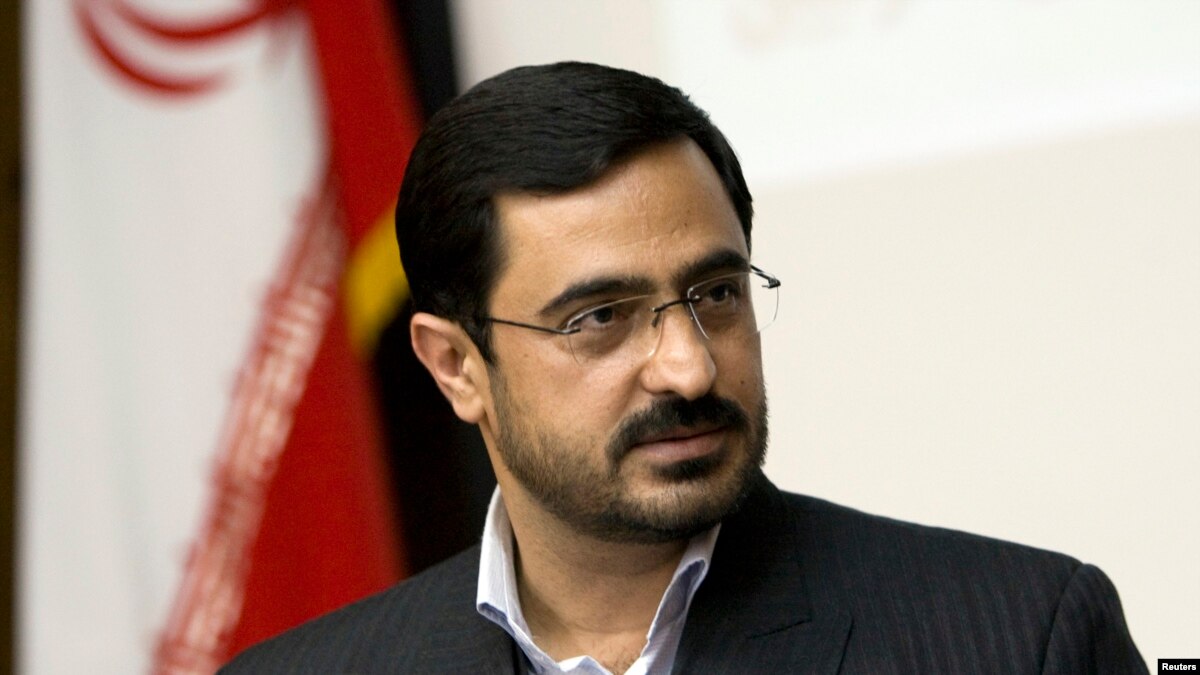
Iranian police have arrested a former prosecutor known as the “torturer of Tehran,” who faces a two-year prison sentence over the death of prisoners following 2009 protests, Iranian media reported Sunday.
The official website of the judiciary, Mizanonline.com, said former Tehran prosecutor Saeed Mortazavi had been arrested, without elaborating. The semi-official Tasnim news agency said police detained Mortazavi in a villa in northern Iran, near the Caspian Sea.
Mortazavi was sentenced to prison by an appeals court in December. That court found him guilty of “abetting and aiding” torture and the deaths of protesters arrested after the disputed re-election of hard-line President Mahmoud Ahmadinejad.
Wanted posters
Since that court decision, Mortazavi apparently couldn’t be found by authorities.
“They could not find him despite the arrest warrant,” judiciary spokesman Gholamhossein Mohseni Ejehi said last week.
After the reports of his disappearance, wanted posters printed by activists began appearing around Tehran.
Mortazavi’s wife and lawyer denied he was missing, but said he was looking to appeal the ruling. His lawyer could not be immediately reached Sunday.
Photojournalist's death
Canada has blamed Mortazavi for the death in custody of Iranian-Canadian photojournalist Zahra Kazemi in 2003. Iranian reformists accused Mortazavi of trying to stage a cover-up because he reported that Kazemi died of a stroke.
A government committee probing her death later found that she had died of a fractured skull and brain hemorrhage from a blow to the head. No charges were filed against Mortazavi.
He is detested by those pushing for social and political reforms. Critics have dubbed him the “butcher of the press,” and the “torturer of Tehran” because he was behind the closure of some 120 newspapers and the jailing of many journalists and political activists over the past decade.
Saturday, April 21, 2018
Iran Would Discuss Prisoners if US Showed Respect, Zarif Says
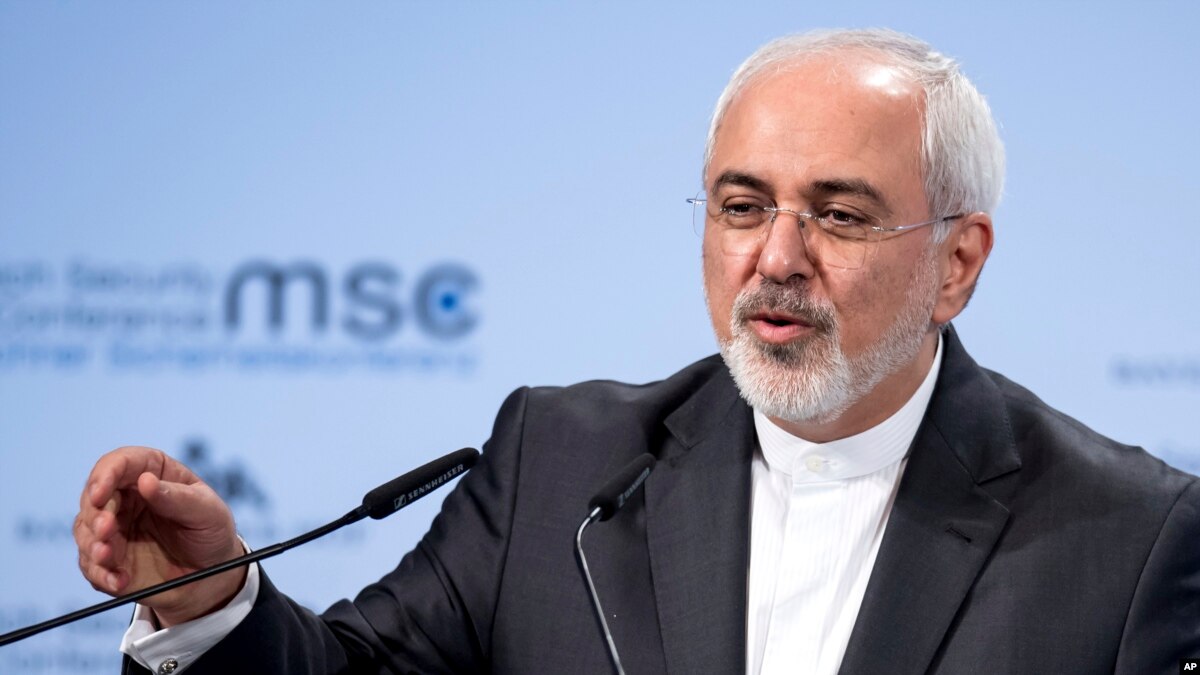
Iranian Foreign Minister Mohammad Javad Zarif says Tehran is open to prisoner swap negotiations with the United States if the Trump administration shows a "change of attitude."
Negotiations are a "possibility certainly from a humanitarian perspective, but it requires a change of attitude," Zarif said in an interview with CBS television's Face the Nation set to air Sunday.
Five Americans are held in Tehran, including Baquer Namazi, 81, who is in failing health.
Zarif blasted the U.S. administration for showing "disrespect" toward Iran, a frequent target of President Donald Trump's wrath.
Trump has said he wants to rip up the Iran nuclear deal, and his new national security adviser, John Bolton, has advocated regime change in Tehran.
"You do not engage in negotiations by exercising disrespect for a country, for its people, for its government, by openly making claims, including this illusion about regime change," Zarif said, according to interview excerpts.
In January 2016, after months of secret talks between senior Iranian and U.S. officials during Barack Obama's administration, Tehran released four Americans in exchange for seven Iranians being released in the United States.
A fifth American, identified as Matthew Trevithick, was also released separately as an "associated goodwill gesture."
According to Zarif, there are "many" Iranian prisoners being held in the United States or elsewhere at America's request, "including a lady who had to give birth in an Australian prison because of a U.S. extradition request."
Dozens of Bodies Reported Found in Raqqa Mass Grave
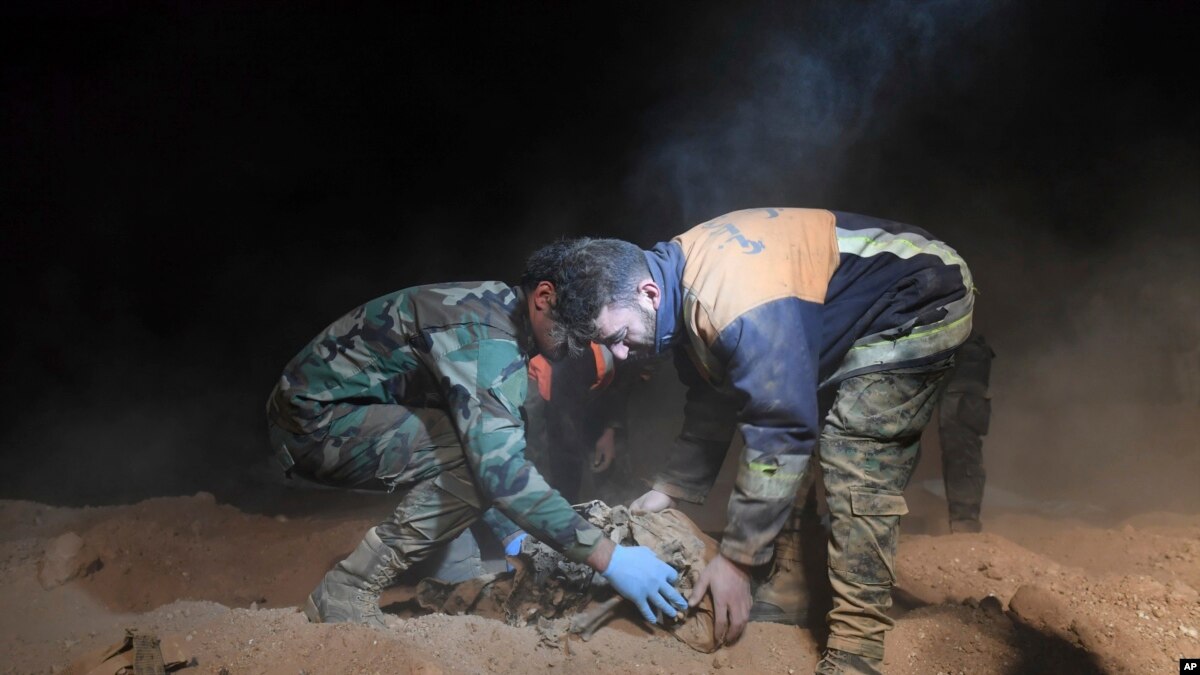
Dozens of bodies, including those of jihadists and civilians, have been found in a mass grave in the former Islamic State group stronghold of Raqqa, Syria, a local official said Saturday.
The former de facto capital of the group in northern Syria, Raqqa saw the jihadists ousted by the U.S.-backed Syrian Democratic Forces in October 2017.
Nearly 50 bodies had already been recovered from the mass grave, which could contain up to 200 bodies, said Abdallah al-Eriane, a senior official with the Raqqa Civil Council now running the city.
The mass grave was located under a soccer pitch, close to a hospital where the jihadists had dug in before being chased out of the city.
"It was apparently the only place available for burials, which were done in haste. The jihadists were holed up in the hospital," the official said, adding that some bodies were marked with the nom de guerre of the jihadist while civilians just had first names.
In recent months, both Syria and Iraq have discovered mass graves in areas previously occupied by the jihadists.
Syrian troops uncovered a mass grave containing the remains of more than 30 people killed by IS in Raqqa province in February. That followed two other similar finds by the Syrian army.
The Islamic State group, which proclaimed a caliphate over swaths of Syria and Iraq in 2014, has now lost almost all the land it once controlled. It has been held responsible for multiple atrocities during its reign of terror, including mass executions and decapitations.
Saudi Security Shoots Down Toy Drone Near Palace
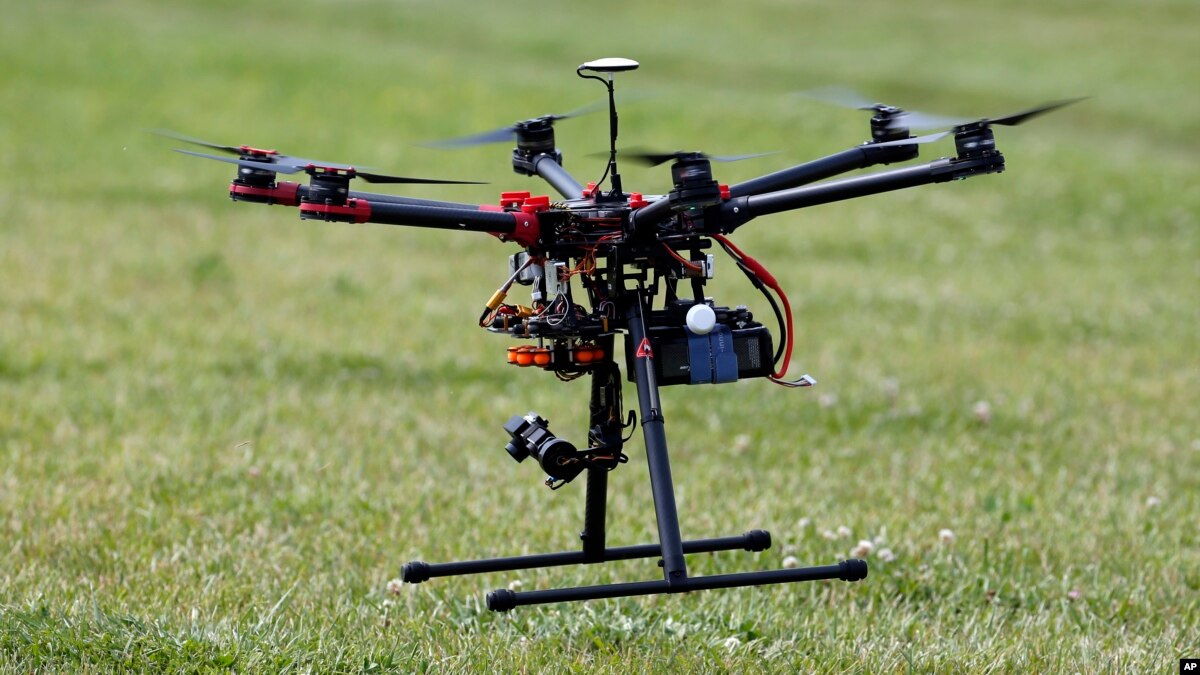
Saudi Arabian security forces shot down a toy drone Saturday in Riyadh, a senior Saudi official and the state news agency said, after videos were posted online showing gunfire in a neighborhood where a royal palace is located.
A spokesman for the Riyadh police said forces at a checkpoint in the Khozama district identified the drone and "dealt with it according to their orders," state news said.
No information was given about whether there were any injuries or damage.
Hamas Says Man Gunned Down in Malaysia Was Important Member
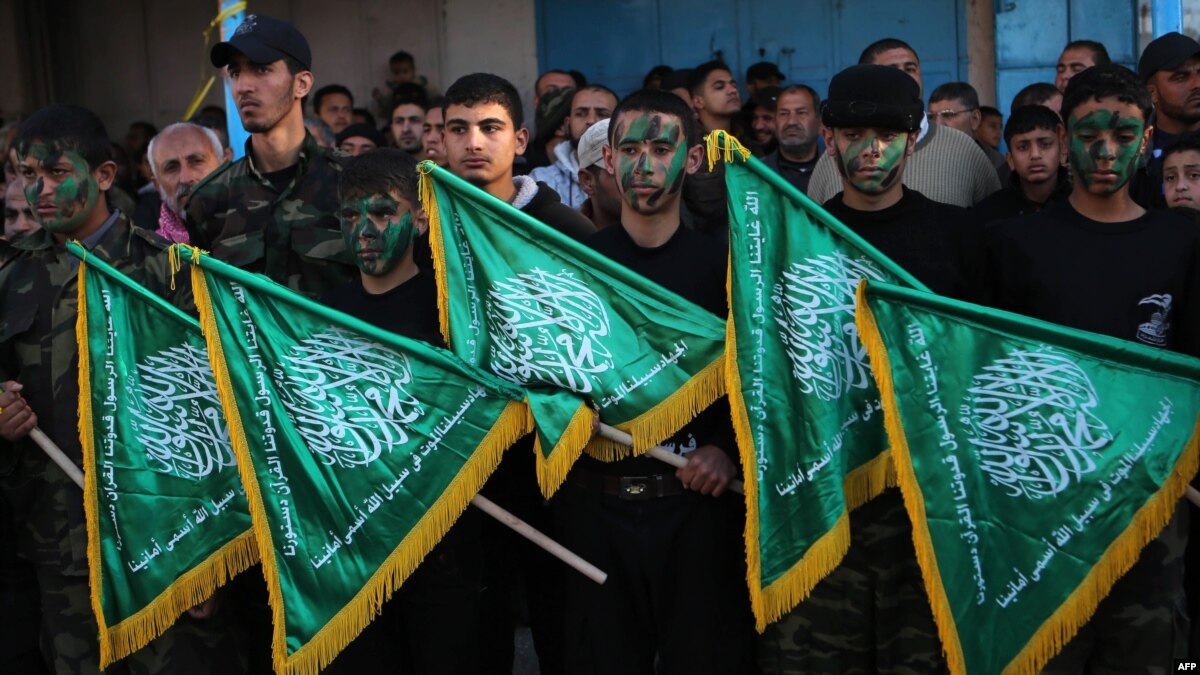
Gaza's ruling Hamas militant group said Saturday that a man who was gunned down in Malaysia was an important member of the organization, raising suspicions that Israel was behind the brazen killing.
Hamas said Palestinian engineer Fadi al-Batsh was a "loyal" member and a "scientist of Palestine's youth scholars." It gave no further details on his scientific accomplishments but said he had made "important contributions" and participated in international forums in the field of energy.
Hamas stopped short of blaming Israel, saying only that he had been "assassinated by the hand of treachery." But relatives of al-Batsh said they believe Israel targeted him.
Malaysian police say the 36-year-old al-Batsh was gunned down early Saturday by two assailants who shot at least eight bullets from a motorbike as he was heading to a mosque for dawn prayers in Kuala Lampur. It said closed-circuit television showed him targeted by assassins who had waited for him for almost 20 minutes.
Malaysia's deputy prime minister Ahmad Zahid Hamidi said the government was looking into the possibility of the involvement of "foreign agents" in his killing. He told local media that initial investigations showed the assailants were "white men" driving a powerful BMW 1100cc motorbike.
Besides his Hamas affiliation, al-Batsh was a cousin of Khaled al-Batsh, a senior official in the Islamic Jihad militant group, who accused the Israeli Mossad spy agency of the assassination, without providing evidence.
The Israeli government had no comment. But Israel has a long history of suspected targeting of wanted Palestinian militants in daring overseas operations around the globe and has been linked to other assassinations as well, though it has never acknowledged them.
Al-Batsh specialized in electrical and electronic engineering and worked at a Malaysian university. He had lived there with his family for the past eight years and was an imam at a local mosque.
He received his Ph.D degree from the University of Malaya in 2015 and was a senior lecturer at the British Malaysian Institute. His official biography said his research interests included power converters, power quality and renewable energy.
However, Israeli media reported that he was also deeply involved in the Hamas drone development project.
Israel and Hamas are bitter foes who have fought three wars since 2008. Tensions have risen in recent weeks with a series of mass protests along the Gaza border in which 32 Palestinians have been shot dead by Israeli troops since late March.
Hamas says the protests are aimed at breaking a crippling border blockade that was imposed by Israel and Egypt after the Islamic militant group overran Gaza in 2007, a year after winning Palestinian parliament elections. It says it also aims to assert the right of refugees to return to their former homes in Israel.
Israel accuses Hamas, which is sworn to Israel's destruction and has carried out dozens of deadly suicide bombings against it, of cynically exploiting Gaza civilians for its political aims by staging the protests and trying to carry out attacks under their cover.
Israel has used lethal force against unarmed protesters, but it says it is only targeting instigators who are trying to damage the border fence with explosives, firebombs and other means. However, the United Nations, the European Union and rights groups have questioned Israel's use of force when soldiers' lives are not in danger and the U.N. and E.U. have called for investigations.
Protests are aiming to culminate in a large border march on May 15, the 70th anniversary of Israel founding. The date is mourned by Palestinians as their "nakba,"or catastrophe, when hundreds of thousands were uprooted in the 1948 Mideast war over Israel's creation.
Search
Featured Post
Tornado Watch for parts of Middle Georgia - wgxa.tv
[unable to retrieve full-text content] Tornado Watch for parts of Middle Georgia wgxa.tv "middle" - Google News December 30...
Postingan Populer
-
[unable to retrieve full-text content] Monroe County Middle School goes virtual next week due to COVID-19 exposure wgxa.tv "middl...
-
Members of the Meany Middle School PTSA are calling on Mayor Jenny Durkan , Seattle Parks , and City of Seattle officials to give a group...
-
The global demand for palm oil is driving the fires in Indonesia Quartz Palm oil is in your infant formula, chips, and shampoo. Develope...